#same problem with the two david mitchells
Explore tagged Tumblr posts
Text

The book I bought was from a different John Taylor, babes.
0 notes
Text
Call this the final apotheosis of economics as common sense. Money is unimportant. Economies—“real economies”—are really vast barter systems. The problem is that history shows that without money, such vast barter systems do not occur. Even when economies “revert to barter,” as Europe was said to do in the Middle Ages, they don’t actually abandon the use of money. They just abandon the use of cash. In the Middle Ages, for instance, everyone continued to assess the value of tools and livestock in the old Roman currency, even if the coins themselves had ceased to circulate.6 It’s money that had made it possible for us to imagine ourselves in the way economists encourage us to do: as a collection of individuals and nations whose main business is swapping things. It’s also clear that the mere existence of money, in itself, is not enough to allow us see the world this way. If it were, the discipline of economics would have been created in ancient Sumer, or anyway, far earlier than 1776, when Adam Smith’s The Wealth of Nations appeared. The missing element is in fact exactly the thing Smith was attempting to downplay: the role of government policy. In England, in Smith’s day, it became possible to see the market, the world of butchers, ironmongers, and haberdashers, as its own entirely independent sphere of human activity because the British government was actively engaged in fostering it. This required laws and police, but also, specific monetary policies, which liberals like Smith were (successfully) advocating.7 It required pegging the value of the currency to silver, but at the same time greatly increasing the money supply, and particularly the amount of small change in circulation. This not only required huge amounts of tin and copper, but also the careful regulation of the banks that were, at that time, the only source of paper money. The century before The Wealth of Nations had seen at least two attempts to create state-supported central banks, in France and Sweden, that had proven to be spectacular failures. In each case, the would-be central bank issued notes based largely on speculation that collapsed the moment investors lost faith. Smith supported the use of paper money, but like Locke before him, he also believed that the relative success of the Bank of England and Bank of Scotland had been due to their policy of pegging paper money firmly to precious metals. This became the mainstream economic view, so much so that alternative theories of money as credit—the one that Mitchell-Innes advocated—were quickly relegated to the margins, their proponents written off as cranks, and the very sort of thinking that led to bad banks and speculative bubbles in the first place. David Graeber, Debt: The First 5000 Years
0 notes
Text
This weekend, I was challenged to diagram the 3 color weave for a 30 piece origami modular. This is a slightly challenging problem that comes to me intuitively. I've explained it to other intuitive folders and mathematicians with repeatable successes. However, I've been challenged to go one step further to document or diagram the "map" so that I will never have to "figure it out" again. Electra is an origami modular, folded from a square, published in Paul Jackson's book, "The Ultimate Papercraft and Origami Book" and attributed to Origami Artist David Mitchell.
Step 1

Fold a preliminary base with pre-creased blintzes and two cupboard pinches. When collapsing the preliminary base, put back two blintzes on opposite corners.
Step 2
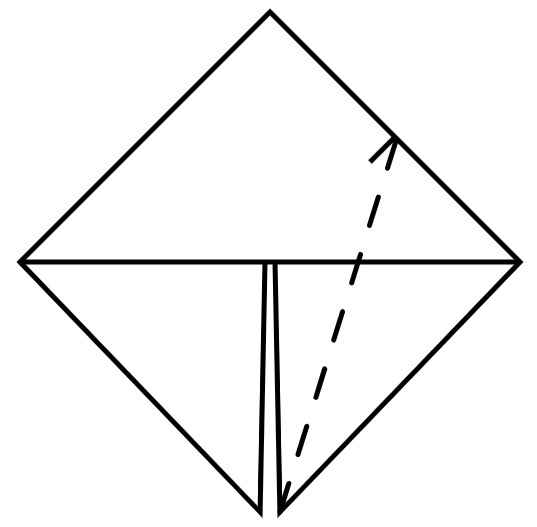
Find the pinch guideline and fold a long diagonal from the bottom tip to the pinch. This causes the flap to go over the center vertical, which is required to create the pocket. Crease this on the right hand side of the front, flip the model over and crease the right hand side on the back. If you swap sides, and crease only on the left hand side, that's okay too, as long as you repeat on the left side from behind. Finally, inside reverse the long diagonal and find those two missing blintz pre-creases and put them back in place. This will make the basic unit which can make modular with nearly any multiple of 3. Unit count 12, 24, 30, 60, 90

In this photo you can see a bright pink unit and two different shades of blue. Let's call them Pink, Blue, Light. The word light meaning a shortened version of "light blue."

In this photo overlay, you can see that the Blue units form a star pattern. This is my old method for both solving the color weave and also teaching it. But we can start from this photo to graph out a color map for 30 pieces with the central starting point being the five units in the lower front of this photo, "Pink, Light above a single Blue with Pink, Light below."
Hub 1 This is a starting form of five units in an X-shape. It can be defined as a Blue Hub, with the Blue in the center and has two Pink and two Light units attached. You can also say that the pattern is BPLPL. Meaning that the four units surrounding the center unit are mirrored Pink, Light. You can make three more units with these five colors: BPLLP, BLPLP, BLPPL.

Ring 1 Here is another way to identify five units, this time in a ring of five, also one of the polygon faces. The ring below is identified for it's single Pink with two Blue and two Light units. You can call this ring PBLBL. There is only one other ring that you can create with the same units: PLBLB.

Ring 2 Here is the second ring. LPBPB

Ring 3 Here is the third ring. PBLBL

Here is the whole 30 pieces mapped. Now this is just one mapping, and there should be a couple different ways to map this pattern over this polyhedron. However, there should only be two different ways to map it, once you have locked onto the first five pieces from "Hub 1"
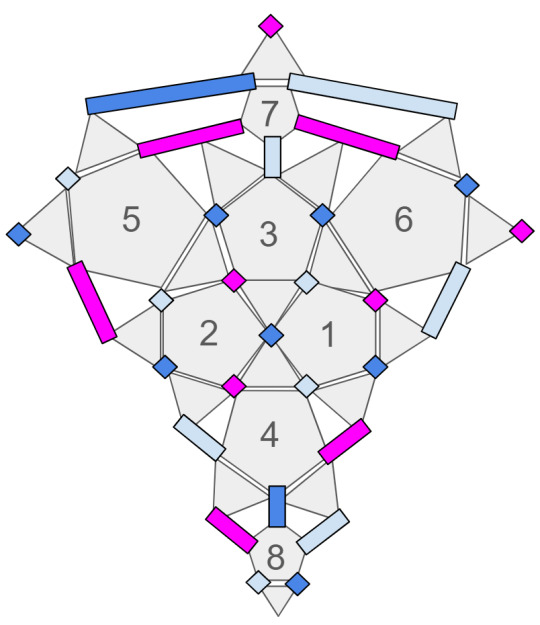
0 notes
Text
Lose weight while you sleep.
The secret methot that will help you lose weight while you sleep.
The journey of a thousand miles begins with one step.
(No, It's Not About Dieting or Exercising Harder)
"Nothing in the world can take the place of Persistence. Talent will not; nothing is more common than unsuccessful men with talent. Genius will not; unrewarded genius is almost a proverb. Education will not; the world is full of educated derelicts. The slogan 'Press On' has solved and always will solve the problems of the human race." —Calvin Coolidge
Are you facing difficulties in achieving your weight loss goals through traditional diet and exercise methods? Well, it turns out that there might be an additional way to enhance your progress.
According to a study published in the National Center for Biotechnology Information, a common factor was identified among individuals struggling with weight issues: lower core body temperature. In contrast, slender individuals with higher metabolic rates exhibited normal body temperatures.1
In another study conducted in 2021, researchers delved into the relationship between body temperature and cognitive performance. Their findings revealed a noteworthy correlation between skin and core body temperature, as measured in controlled laboratory settings, and both general cognitive function and specific cognitive domains.
John's Decade-Long Struggle: Unveiling the Weight Loss Secret
After battling with weight issues for a staggering ten years, John finally stumbled upon the secret to shedding those extra pounds! And the best part? It doesn't involve rigorous
"The road to success and the road to failure are almost exactly the same." — Colin R. Davis
“Success usually comes to those who are too busy looking for it.” — Henry David Thoreau
Just before you hit the sack tonight, consume two capsules of THIS remarkable supplement (preferably before 10pm), and witness how it can revitalize your metabolism. This scientific loophole has been found to dissolve fat overnight, leaving you astounded by the results.
Discover the Astonishing Fat-Dissolving Loophole That Transforms Your Body
Imagine a weight loss strategy that doesn't rely on strict dietary restrictions or grueling workouts. Picture yourself enjoying your favorite foods while effectively melting away excess fat. Well, that's precisely what this recently uncovered scientific loophole offers!
Meet Jason Mitchell, a 43-year-old who successfully dissolved an impressive 52 lbs of fat using this unconventional approach. Cheryl, a 54-year-old from Memphis, witnessed a remarkable reduction of 29 lbs thanks to this method. Once I experienced the astonishing fat-melting effects myself, I felt compelled to share this incredible discovery with you. Don't miss out on this hidden gem—try it for yourself right here.
"Success is not final; failure is not fatal: It is the courage to continue that counts." — Winston S. Churchill
Unveiling the Unconventional Secret to Deep Sleep and Weight Loss
Alternative Subject: Unusual Technique Melts Stubborn Arm and Butt Fat While You Sleep
A groundbreaking study has revealed an extraordinary solution that accelerates metabolism and eradicates fat by targeting a newly discovered "root cause" of arm, butt, and hip fat accumulation. Surprisingly, this method proves to be up to 556% more effective than exercise alone—even during periods of restful sleep. Additionally, it has been found to outperform any diet by up to 611% in burning fat from the buttocks, arms, and neck. Notably, even renowned TV personality Dr. Oz featured it on his show, referring to it as a "booty fat buster"!
Are you curious to uncover the secret? Simply click the link to reveal the astonishing answer.
“Nature has given us all the pieces required to achieve exceptional wellness and health, but has left it to us to put these pieces together.”—Diane McLaren
TR Night Burner: Revolutionizing Fat Burning and Cognitive Functioning
Introducing TR Night Burner—a product unlike anything you've ever encountered before. This groundbreaking solution stands alone in its ability to simultaneously target both fat burning and cognitive functioning. What sets it apart from other products is its profound impact on your natural body temperature, which plays a pivotal role in achieving your diet and exercise goals.
While TR Night Burner aids in improving sleep quality, its benefits extend far beyond restful slumber. When combined with healthy lifestyle habits, this innovative supplement positively influences your overall well-being and mental functioning. Let's delve deeper into how TR Night Burner can transform your weight loss journey and cognitive abilities.
1. Unleashing the Power of Natural Body Temperature
Your body temperature plays a significant role in regulating various bodily functions, including metabolism and cognitive performance. TR Night Burner recognizes the importance of maintaining an optimal core body temperature to achieve your desired weight and enhance mental clarity.
By incorporating scientifically formulated ingredients, TR Night Burner supports the body's natural fat-burning processes. It helps elevate core body temperature, enabling your metabolism to operate at its peak potential. As a result, you experience an increased calorie burn and improved fat oxidation, leading to more effective weight management.
2. Enhancing Sleep Quality for Optimal Well-Being
Quality sleep is vital for overall health and weight management. TR Night Burner goes beyond being a simple sleep aid. Its unique blend of ingredients promotes deep, restorative sleep while optimizing your body's internal mechanisms.
During sleep, TR Night Burner actively works to support your body's recovery processes. By facilitating the release of essential hormones, it helps regulate appetite, energy levels, and mood. With improved sleep quality, you wake up refreshed, revitalized, and ready to tackle your diet and exercise goals with renewed vigor.
3. Amplifying Cognitive Functioning and Mental Clarity
In addition to its impact on weight loss, TR Night Burner boasts profound benefits for cognitive functioning. The supplement's innovative formulation aids in optimizing brain health and enhancing mental clarity, supporting you in achieving peak cognitive performance.
The carefully selected ingredients in TR Night Burner have been studied for their ability to promote focus, memory, and overall cognitive abilities. By stimulating neural pathways and improving neurotransmitter activity, this product can sharpen your mental acuity and provide you with the mental edge necessary to stay committed to your weight loss journey.
4. Synergistic Effects with Healthy Lifestyle Habits
To fully unleash the potential of TR Night Burner, it is essential to combine its usage with healthy lifestyle habits. While this supplement can provide remarkable support, it is not a magical solution on its own. Incorporating regular exercise, a balanced diet, and mindful practices will synergistically amplify the effects of TR Night Burner, helping you achieve your desired weight and cognitive goals more effectively.
Remember, TR Night Burner is not just another run-of-the-mill product. Its innovative approach to addressing both fat burning and cognitive functioning sets it apart from the rest. By optimizing your body's natural temperature and promoting quality sleep, this groundbreaking supplement unlocks your potential for weight loss success. Furthermore, its cognitive-enhancing properties empower you to attain mental clarity and focus, propelling you towards your desired cognitive goals.
Embrace the transformative power of TR Night Burner and experience a new dimension in weight loss and cognitive enhancement. Combine it with healthy lifestyle habits, and embark on a journey towards a healthier, slimmer, and sharper version of yourself.
Boosting Metabolism: The Power of Green Coffee Bean Extract
When it comes to accelerating fat burning and kickstarting your metabolism, green coffee bean extract takes the spotlight. This powerful ingredient is a key component of our Night Time Fat Burner, meticulously chosen for its ability to fuel fat burning and promote a faster metabolism. By including only high-quality ingredients, we ensure that you can achieve the best weight loss results both quickly and safely.
Effective Appetite Suppressant and Carb Blocker
Weight loss is not just about burning fat; it's also about managing your appetite and curbing cravings. Our Night Time Fat Burner contains essential proteins that act as effective appetite suppressants. These proteins safely increase the levels of hormones in your body, helping you feel full for longer periods. By curbing your appetite, you'll be better equipped to stick to your dietary goals and make healthier food choices.
Working While You Sleep: Maximizing Fat Burning Potential
It may sound too good to be true, but with our Night Time Fat Burner, you can literally burn fat while you sleep. While you enjoy a restful night's sleep, our powerful formula continues to work diligently, utilizing the nighttime hours to maximize fat burning potential. By optimizing your body's metabolic processes, our supplement ensures that your weight loss efforts are in motion 24/7.
Wake Up Refreshed: Rejuvenating Sleep and High Energy Levels
One common concern with weight loss supplements is the potential compromise of energy levels and the resulting grogginess upon waking up. However, with our Night Time Fat Burner, you can put those worries to rest. Our carefully crafted formula not only aids in shedding excess pounds but also promotes restful sleep. By supporting a deep and rejuvenating sleep cycle, you'll wake up feeling refreshed, energized, and ready to take on a new day of healthy choices and active pursuits.
Quality Assurance: Our Commitment to Customer Satisfaction
At [Company Name], we take immense pride in providing our customers with top-quality products. Your satisfaction is our utmost priority. If, for any reason, you are not completely satisfied with our Night Time Fat Burner, please reach out to us immediately. We are dedicated to doing whatever it takes to make you happy and ensure your weight loss journey is a successful and positive experience.click the link
Compare with Similar Items: The Superior Choice
When it comes to selecting the right weight loss supplement, it's crucial to make an informed decision. Our Night Time Fat Burner stands out among similar products for several reasons. Firstly, we utilize high-quality ingredients, ensuring that you receive the most effective and safe formula. Secondly, our supplement offers the dual benefits of boosting metabolism and curbing appetite, making it a comprehensive solution for weight loss. Thirdly, our unique formulation enables you to burn fat while enjoying a peaceful night's sleep, maximizing your weight loss potential.
Don't settle for mediocre products when you can choose the superior option. Trust [Company Name] and experience the transformative power of our Night Time Fat Burner. Join countless men and women who have seen remarkable results without compromising their energy levels or sacrificing quality sleep. Take the first step towards achieving your weight loss goals and embrace a healthier, happier version of yourself.
Certainly! Here are 10 easy steps you can take to help you lose weight:
2. Create a Calorie Deficit: To lose weight, you need to consume fewer calories than you burn. Calculate your daily calorie needs and aim for a moderate calorie deficit to ensure sustainable weight loss.
3. Eat a Balanced Diet: Focus on consuming a well-balanced diet that includes lean proteins, whole grains, fruits, vegetables, and healthy fats. Avoid or limit processed
4. Portion Control: Be mindful of portion sizes and avoid overeating. Use smaller plates and bowls, and listen to your body's hunger and fullness cues.
10. Seek Support: Consider joining a weight loss support group or enlisting the support of friends and family. Having a support system can provide motivation, accountability, and encouragement throughout your weight loss journey.
Remember, sustainable weight loss is a gradual process. Focus on making long-term lifestyle changes rather than relying on quick fixes. Patience, consistency, and perseverance are key to achieving your weight loss goals.
0 notes
Link
“The federal budget assumes the government will recover 96 cents of every dollar borrowers default on,” Mitchell wrote. This banker, Jeff Courtney, put that figure closer to just 51 to 63 cents.
Now, for a private lender, like a bank, this projected shortfall would indeed be a ticking time bomb. The bank might be in danger of insolvency (unless, of course, it was rescued by a federal government that could give the bank an emergency cash infusion and take those bad loans off its hands). But there’s no real danger of a federal Cabinet-level department becoming insolvent. The Treasury Department is already in the habit of making up the Education Department’s budgetary shortfalls.
So what is the problem again? Typically for a news outlet like the Journal, the story describes this potential shortfall as what “taxpayers” would be “on the hook for,” but obviously, we all know that that is not how federal budgeting works. Taxes could rise for certain people for certain reasons, but no one will receive an itemized bill for this uncollected debt. And as for that large, catastrophic number ($500 billion!) that might never be paid back, it amounts to less than one year of a national defense budget that “taxpayers” are similarly “on the hook for.” (The Journal’s editorial board recently complained that the Biden administration’s proposed 2022 $715 billion Pentagon budget, while an increase in real terms, nonetheless represents an unconscionable decline in the defense budget as share of gross domestic product. “Taxpayers” are not mentioned in the editorial.)
Democrats helped sacrifice a generation of students to the deficit god, in exchange for meaningless numbers in a report.
The story, then, is that the government might not collect some debt, even if it currently pretends, for budgetary reasons, that it definitely will, and, as a result, the deficit may rise to levels higher than the current estimates predict. For a committed conservative, such as DeVos, that situation is inherently scandalous. For everyone else, that could only ever become a problem in the future, and only if that future deficit has some negative effect on the overall economy, which is not very likely considering the entire recent history of federal deficits and economic growth.
That state of affairs may explain why articles like the one in the Journal so often invoke “taxpayers,” as if everyone would have to write personal checks to cover the Department of Education’s shortfall: because without imagining taxpayers as victims of government deficits, it’s hard to point to anyone actually harmed by a government department giving unrealistic estimates of future revenues.
Except in this story, there are actual victims: the people who hold debt that the government doesn’t realistically expect to collect in full but who are bled for payment regardless. As Courtney’s report found, because of the importance of these loans to the department’s balance sheet, the government keeps borrowers on the hook for the loans even if they will never be able to repay all of the money they owe, often by placing borrowers on a repayment plan tied to their income. (As the economist Marshall Steinbaum has explained, the “income driven repayment,” or IDR, program is framed as a means of helping borrowers, but in reality, it “exerts a significant drag on their financial health, to no apparent purpose” by forcing them to “make less-than-adequate payments for many years before their debt is finally cancelled.”) The victim of such a scheme isn’t taxpayers, it’s debtors.
There’s one particular portion of The Wall Street Journal’s story that the public should treat as a moral and political scandal (the emphasis here is mine):
One instance of how accounting drove policy came in 2005 with Grad Plus, a program that removed limits on how much graduate students could borrow. It was included in a sweeping law designed to reduce the federal budget deficit, which had become a concern in both parties as the nation spent on wars in Iraq and Afghanistan and as baby-boomer retirement was set to raise Social Security and healthcare outlays.
A key motive for letting graduate students borrow unlimited amounts was to use the projected profits from such lending to reduce federal deficits, said two congressional aides who helped draft the legislation.
Each change was publicly justified as a way to help families pay for college or to save the taxpayer money, said Robert Shireman, who helped draft some of the laws in the 1990s as an aide to Sen. Paul Simon (D., Ill.) and later was deputy under secretary of education in the Obama administration.
But how agencies such as the Congressional Budget Office “score” such changes—determine their deficit impact—“is a key factor in deciding whether a policy is adopted or not,” Mr. Shireman said. “The fact that it saved money helps enact it.”
To explain this more plainly, Democrats helped sacrifice a generation of students to the deficit god, in exchange for meaningless numbers in a report, because CBO scores are more real to senators than flesh-and-blood people.
This is the sort of depravity that deficit obsessions produce. The Iraq War needed to be “paid for” with the future earnings of students who, lawmakers imagined, would eventually be rich, even as many of the same lawmakers voted to cut taxes on already-rich people. Now the debt of the still-not-rich students can’t be forgiven because of its importance to the federal government’s predicted future earnings. And politicians and commentators in thrall to deficit politics still paint the situation as a morality tale, in which the borrowers are irresponsible for having the debt and the government would be irresponsible to forgive it. After all, think of the poor taxpayers.
The early days of the Biden administration led some to believe we were finally free of this incoherent political mode, where dubious predictions in CBO reports dictate the limits of the politically possible and determine who will be arbitrarily punished for the sake of limiting the size of a program in a speculative 10-year budget projection. The proof that Democrats had learned their lesson was one major piece of legislation, the American Rescue Plan, designed to respond to a unique emergency.
More recently, the administration, and some of its allies in Congress, have signaled strongly that they’re returning to the old ways. The American Prospect’s David Dayen has reported that the White House is determined to “pay for” its infrastructure plans, and Treasury Secretary Janet Yellen is apparently leading the charge to ensure the infrastructure spending is “offset.” This will have the likely effect of limiting the scope of the plan, once again sacrificing material benefits for the sake of estimates and predictions from the CBO.
The Biden administration seems to be determined to go about this without violating its pledge not to raise taxes on any American making less than $400,000 (a threshold meant to define the upper limit of “middle class” despite being comically higher than the Obama administration’s similar $250,000 limit for tax hikes). It has floated increasing IRS enforcement and raising the capital gains tax for the wealthiest Americans. Both are fine ideas. But the best thing about taxing the rich is not that you can use their money for infrastructure, it’s that doing so reduces their political and economic power. That’s also the reason why it’s so difficult for Washington to do it.
The complete incoherence of the current Democratic position on spending and deficits is summed up well in another Wall Street Journal story, where Montana Senator Jon Tester was quoted saying, “I don’t want to raise any taxes, but I don’t want to put stuff on the debt, either.… If we’re going to build infrastructure, we have to pay for it somehow. I’m open to all ideas.”
“Open” to “all ideas” but unwilling to tax the rich, and unwilling to allow a CBO report to show a larger deficit as a result of needed spending: This is more or less precisely the dynamic that led student loan debt to explode in the United States, and it’s the zombie worldview that threatens any chance of this government averting a multitude of political, economic, and ecological disasters.
205 notes
·
View notes
Text
The alluring charm of Henry Cavill - Epilogue
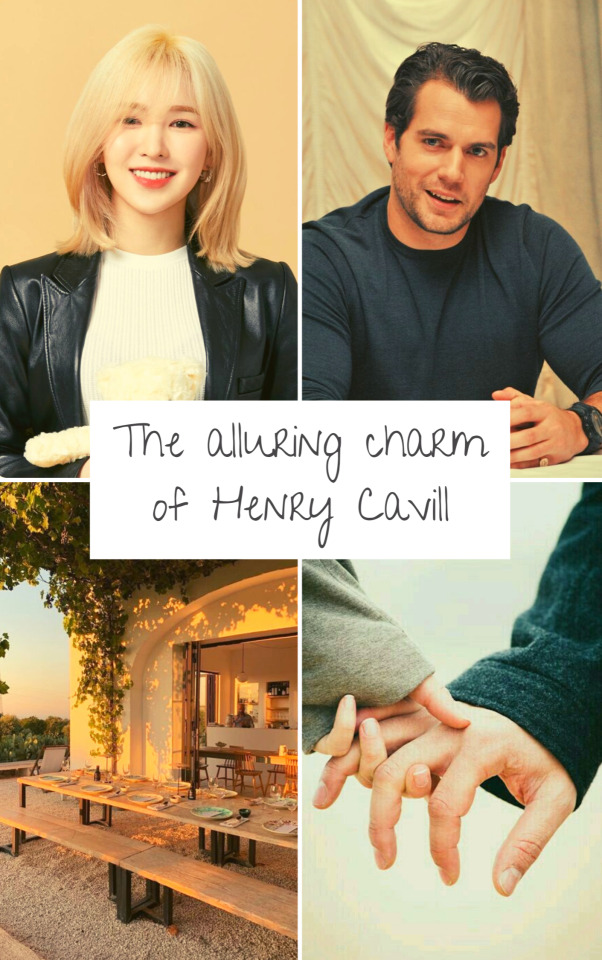
Summary: A few months have passed. How are Adelaide and Henry holding up?
Henry Cavill x Adelaide Park (ofc)
Wordcount: 2k
Warnings: None
Masterlist // Previous chapter //
‘Hello everybody,’ Henry says into the camera.
His beautiful girlfriend sits next to him on a chair, but since she is so short, her legs are dangling off the chair, while he has planted both of his feet on the floor. He looks to the side, simply to take in her beauty, even if it’s just for a short time. ‘My name is Adelaide Park.’
‘And I am Henry Cavill and we are doing the Wired Autocomplete Interview.’
Henry watches these types of interviews religiously and he always wanted to do this. And now he gets to do it with his gorgeous Adelaide.
They recently starred in a new romantic comedy: I’m sorry I hit you with my car. It’s about a woman named Jazz Mitchells, who accidentally hits one of the top attorneys in the country Declan Stanford with her car. Because of the impact, Declan permanently loses his vision. Jazz feels so guilty, she decides she should become his assistent, since she has a law degree, but due to personal matter hasn’t used it. Obviously—it’s a romantic comedy—they fall in love with one another, though Declan has never seen Jazz. It’s hard on him, since he—surprise surprise—is extremely superficial and only cares about looks.
When Henry read the script, he was slightly intrigued, however when Adelaide was sent the script as well, because the director wanted her as Jazz Mitchels, he was more than intrigued. Starring alongside his crazily talented girlfriend made the experience worth while. People already speculated they are dating again, however they have yet to go public. They made up nine months ago, but keep their relationship pretty under the radar. They started out in the public eye and that went south. Despite the two of them not being involved in reality tv, they wanted to take it slow, without the hot and demanding breaths of the fans and paparazzi in their necks.
Henry holds the board for Adelaide, as she peels off the sticker to reveal the first question. ‘Is Adelaide Park Korean?’ She nods as she looks into the camera. ‘One hundred percent.’
Henry can’t help but stare at her and when her eyes meet his, she flashes him a lovely smile. He’ll never get tired of seeing that smile.
‘Is Adelaide Park related to Park Jimin from BTS?’ She starts to chuckle. ‘No, but I wish. Wouldn’t that be super awesome? If that were the case though, I’d rub that fact into people’s faces everywhere I go. Okay, next one: is Adelaide Park tall?’
Henry can’t help but snort. ‘She is everything but tall,’ he says, before she gets the chance to answer it.
She pouts as she looks his way and his heart swells at the sight. ‘No?’
‘Sorry, Addy.’ He bumps his knee against hers.
‘Is Adelaide Park Lara Croft?’ Adelaide’s smile becomes brighter and brighter. ‘Well, I’m going to portray her very very soon. I’m so excited, because this will be my first action packed movie.’
Henry looks to the side again, as he watches her beam with pride. When she got the dreading phone call she had been waiting for and the director told her she got the part, she kept it very professional over the phone. However, the second she hung up, tears filled her eyes and she stood in the middle of the kitchen, as she cried with happiness. For the first time she was going to broaden her movie horizon, something she wanted to do so for such a long time. Adelaide is already training pretty hard, so she’s got a more athletic appearance.
He loves the way she is, but the determination she has for this movie, is something he recognizes instantly. Besides, he loves spending even more time with her, as he goes to the same gym as her and together they work out. He even came to the point where he threw everything remotely unhealthy out, so he can eat healthy with her. It’s hard enough already to eat healthy, let alone when he is going to eat his usual snacks right under her nose.
Adelaide has reached the end of the board already and Henry hands it to the woman who gives him the next board. His girlfriend pries the board out of his hands, so she can hold it for him, just like he did for her.
‘Okay, let’s see,’ he says, as he peels off the top sticker. ‘Is Henry Cavill Superman?’ He looks to Adelaide. ‘Am I? I’ve heard I look like the actor, but I don’t really see it.’
She studies his face. ‘Hmm… No, Superman is way hotter than you.’
He spots the mischievous smile on her face that he has come to love. She sticks out her tongue and he can’t help but smile at her.
‘Is Henry Cavill a nerd? I think I qualify as a nerd.’
Adelaide’s eyes widen. ‘You think? You are the biggest nerd I have ever encountered, you dork.’
Henry bumps his shoulder against hers. ‘Is Henry Cavill dating Adelaide Park?’
After they talked about it over coffee and took a swim, they have been on multiple dates and it didn’t take long before they simply fell into their trusted routines. He moved into her apartment when filming and promoting became a daily routine for awhile and the second he stepped in, he realized he was home.
Not long after that, he met her parents. Adelaide is a copy of her dad, look wise and personality wise.They have the same smile and share the same adorable traits; when they eat, they pout, when they watch a movie, they frown. Her mother on the other hand, is a lot more serious and continued to threaten him. She told him multiple times in an ice cold way how she’ll run him over multiple times with her electrical wheelchair if he ever hurts her again.
He is not doubting her at all, but he can guarantee he’ll never do something that idiotic again. He loves Adelaide more than anything in the world and he would be an absolute moron if he ever let her go.
When they were casted for this romantic comedy together, it was such a magical moment. Despite him playing a blind man for seventy five percent of the movie (minus the beginning and the multiple flashbacks), during certain scenes he couldn’t stop staring at Adelaide. Taking in her beauty was becoming so normal for him, that not doing that felt wrong.
During their sex scene, the director wanted to put the focus on him taking in her beauty with his touch, instead with his sight. Touching her wasn’t a problem for him, because he loved touching her, but not getting turned on by her was the hardest part of it all and let’s just say he had to drag her to his trailer afterwards.
‘I am dating Adelaide Park,’ Henry finally says with a disgusting grin on his face. ‘I know a lot of people have been suspecting it for awhile now, but I can confirm that as a matter of fact, we are indeed dating.’ He holds her hand and she starts to blush, because he looks at her, probably with heart eyes, since that always makes her blush. ‘And I’m so incredibly lucky.’
◎ ◎ ◎
When they are home, Adelaide kicks off her shoes and rushes to the couch. With her eyes closed, she is sprawled out on the cushions. ‘Henry,’ she calls out for him, causing him to walk over to her. He sits on the edge of the couch and she holds out her hands for him. ‘Can I have a hug?’ she asks with a slight pout. ‘I don’t feel too good.’
‘Why, love? What’s wrong?’ Henry asks, placing her hand on her cheek.
‘I think I’ve got that nasty flu,’ she says. ‘I felt a little funny during the interview, but now I can finally relax and I feel even worse than before.’ Adelaide sighs and closes her eyes again. ‘Please? That hug?’
He gets on the couch with her, lifting her on his chest and wraps his arms tightly around her. When Henry gently kisses her forehead, he notices she is already heating up a bit. ‘Ah, my love, I think you might be right. Good thing I love taking care of you. You’ll be better in no time.’
‘We need to cancel my parents,’ she mentions. They were supposed to meet them tomorrow, but knowing Adelaide she doesn’t want her mother coming down with this, something that he completely understands, though he is a bit disappointed they are not going to her parents. Spending time with the Parks, is always nice and he loves her parents as if they were his own. Hearing their stories from pre-actress Adelaide are both heartbreaking and encouraging. They love one another in a way they’ll know they can rely on each other. ‘How about we’ll prepare the couch, so it’s a bit more comfortable for us and I’ll make you some chicken broth? You want to watch some tv or a movie?’
She looks up at him with glassy eyes, a clear sign she is indeed coming down with something. ‘I know you wanted to hang out with David tonight and you can still do that. I’m a big girl, I can manage.’
He was jealous of what Adelaide and David had. They were very close friends and a simply look was enough for them to tell each other a lot. Now David Castañeda is one of his best friends and he loves it when they can hang out together. ‘Not when you’re sick. David will understand.’ He lets his hand run over her cheek. ‘I’m sorry you feel like this.’
She shrugs. ‘There have been plenty of moments where I was all alone when I was sick. Now you are here with me, that makes it more doable. Besides, I took care of you and your upset stomach a few weeks ago. It’s only fair that you take care of me right now.’
He chuckles. ‘It’s my absolute pleasure, love.’
After he prepared the couch for her, even helped her changing into something more comfortable and removed her make-up, he heats up some soup for her, as she is watching television. He has already called off David, who actually has come down with a bit of a sore throat himself and rather hangs on his mother’s couch, so they’ll simply reschedule.
Henry plops on the couch again and Adelaide maneuvers herself between his legs, her back against his chest, as she eats her soup.
Henry prizes himself lucky every single day that he is dating this wonderful woman, who has shown him so much. He fucked it up once, but that is not going to happen again. They are in this together and they are going to stay in this together. The movie industry can be a tough one and at first he dreaded the times that he would be in LA, missing his family dearly. However, now he is with Adelaide and no matter where they are, as long as they are together, they are home.
His phone vibrates and he sees he has a message from his brother. He quickly opens it, discretely so Adelaide won’t see it.
Piers: I can finally officially tell you: the arrangements are made. Good thing you told me this far ahead, because that place is booked when it comes to proposals.
Piers: You sure you can wait nine months before you propose to her?
Henry smiles at his phone, before he presses a kiss in Adelaide’s nape. ‘I love you, Addy,’ he whispers to her. ‘You do know that right?’
‘Of course I know that,’ she says as she looks to the side. ‘I love you too.’ When she focuses back on the movie again, he quickly types back a message.
Henry: I can wait, no matter how hard it may seem. I love her a lot, Piers and I’m not letting her go.
Piers: I know you do. Now when are we going ring shopping?
◎ ◎ ◎
A/N: I can’t believe this is the end of this fic 😭😭 Adelaide and Henry are amazing, but I think this is a good place to end the story. I wanna say thank you to everyone who read this. You are fantastic and thank you for the kind words 😘
#henry cavill#henry cavill x ofc#henry cavill x oc#henry cavill x asian ofc#henry cavill x adelaide park#henry cavill fandom#henry cavill fanfic#asian ofc#adelaide park#the alluring charm of henry cavill
95 notes
·
View notes
Text
Do It For the Band, Part Three (fic)
Fandom: Bleach
Pairing: IchiRuki
Summary: When Tatsuki said she wanted their sophomore album to be the next Rumours, this is NOT what she meant. Band AU. Read Part One here and Part Two here
Here’s the thing: Ichigo is not an asshole.
He’s not a misogynist, he doesn’t believe in that men-are-better-than-women bullshit--and that includes the topic of music. Yeah, he loves Jim Morrison and David Bowie and Bob Dylan something fierce--but he’s also a sucker for Nina Simone and Stevie Nicks, for Janis Joplin and Joni Mitchell. Does he hide a tear or two when A Case of You comes onto his “For Mom” Spotify playlist?
None of your damn business. (But yes.)
And maybe this is all to over-explain: he doesn’t have a problem with women challenging him. Look no further than Tatsuki for proof.
… He just has an issue with Rukia challenging him.
And--okay--look. She’s excellent. The stuff that she’s written is so well-crafted it makes his teeth grind in envy, and what she can do with the piano is incredible. She’s talented, she’s brave, she knows a good melody when she hears one, she’s got an electric stage presence, not to mention she’s insanely pretty--
… Talented. She’s insanely pretty talented. Did he already say that?
But all of that does not give her the right to drive him this up the wall.
“I’m telling you,” she repeats coolly, so slowly like she’s explaining something to a child, “I’m telling you, those bars do not work here. It clashes with the lyrics--here, do it again on your guitar, I’ll sing. It sounds clunky.”
“That’s the point! It’s not supposed to be clean!” He runs his hand roughly through his hair, but grabs the guitar from beside him anyway. They’re sitting on the ground in his garage, an hour or so before practice with the rest of the band.
They’ve been at this for a week already, and they’ve had a collective collaboration of…. One. One song that was Rukia’s original creation, and it was like pulling damn teeth to make his own edits. With a song from Chad, that leaves two for their album, and… Six more to go.
Six more to go when they’ve only got three weeks left to make them.
“I understand you weren’t classically trained like I was--”
“Thank God for that, boring shit isn’t my style--”
“How dare you!”
“All right, all right! Look I’m sorry.” He puts his hands up defensively as she huffs, and he is sorry. Kind of. He might enjoy riling her up as much as she does him, but that’s beside the point.
“What I mean is…. I chose these bars with the lyrics because it’s messy. Hear me out: it’s a heartbreak song. Right? This important person in this kid’s life died, right? And he’s trying to get through it. He’s trying to comprehend how something so fucked can happen to the best person he’s known, and--he’s struggling. To understand, to go through his life the same way, whatever. And it’s beyond him. So… This bridge is his having these overwhelming emotions, and stumbling through each individual thought because nothing makes sense. So… It’s not supposed to sound pretty, if that makes sense? Like, the point of the song is it sounds good, just not in a traditional way. Because that’s doing an injustice, to make it sound nice.”
She’s staring at him with an unreadable expression, and Ichigo tries to rewind and remember if he said anything about the song being about his mom’s death. He didn’t--but then he realizes he may as well have.
He clears his throat, looks down and plucks a couple of chords on the guitar to distract himself. “Okay, fine. It’s stupid, let’s just move on to--”
“The line ‘What distracts us from losing someone when they were everything?’ That’s good. I like that a lot. What if you expanded on that, in the bridge?”
“... You got any ideas for that?”
“No. It’s your song, your experience. You do what you want with it.” She shrugs, and rifles through the rest of her notes. He realizes he should probably say something, something like “That’s it?” or “When my mom died I played her favorite album, Jodi Mitchell’s Blue every day for a whole year,” but he’s stumped.
“... Rukia--”
“Just give me the edits and I’ll tell you everything you did wrong.” Her eyes glint, and he rolls his own.
“Yeah yeah, now let’s see what you’ve got, Mozart.”
--
Tatsuki doesn’t know what they’ve been up to for the past three weeks, but whatever’s been going on: it’s working.
The first week was a rough start, when all the vocalists could present her and Chad was a song that--while good--was… One song. Tatsuki thought she was gonna have an aneurism, Rukia looked down sheepishly, Ichigo tried to argue back but looked guilty anyway, and Chad sipped his tea.
“You’re not worried?!” She spun around to her bassist while the lead singers sauntered off, thoroughly chastened. “We’re about to be out of jobs because of those two, how can you just sit there drinking tea?”
Chad shrugged. “No, I’m not really worried. Actually, I think your plan is working a lot better than you think it is.”
She’s about to go off on Chad. Plan? What plan? You’d think I was playing some cupid matchmaker, not maintaining our record deal the way you say that!
But she took one good look at him and sighs. Fighting with Chad isn’t really a fight.
Especially when she’s proved yet again that he’s always right.
The two have just acoustically performed all seven songs that they’ve created, topped off at the end with a song called Sun and Moon that’s bound to be their first single, no question about it. It’s a duet about falling in love with someone who challenges you, and while Tatsuki can easily pinpoint the lyrics Ichigo wrote for it--wow. Somehow in just three weeks the quality of his writing has gotten exponentially better, and she can’t help but feel proud of him.
His strong, gravelly voice with Rukia’s delicate warble ends the last note with a haunting harmony, and the others of the team--Tatsuki, Chad, and Urahara--are silent until Urahara lets out a low whistle.
“Well shit.” He adjusts his hat, chuckling. “I think we’ve got an album, team.”
Tatsuki grins and agrees.
--
Besides the occasional scuffles, Ichigo and Rukia are both rather civilized in the recording room. No storm-outs, no stony silence as they all tune up. The process is….Cordial?
In fact, Tatsuki thinks as she watches them, heads together with the producer, sharing a pair of headphones, If I didn’t know better, I’d say they’re…
She doesn’t hear the conversation, but Ichigo’s turned to Rukia and says something with a snide sideways smirk, and Rukia slaps the back of her hand to his belly with a hard THWAP. Ichigo doubles over, but he’s laughing and she’s shaking her head but she’s smiling and--
Well shit.
The drummer doesn’t have much time to panic about this, though, as just a few seconds later the two ask if everyone’s ready to record the next song.
She breathes in, breathes out. Soul Vibes really is shaping up to be an awesome album, at least.
#ichiruki#bleach#my stuff#ichigo kurosaki#rukia kuchiki#not me unable to resist doing an Ichigo POV!!!!!#I can't help myself
23 notes
·
View notes
Text
You're Back! (Part Two)
The Lost Boys x reader, slight Pete "Maverick" Mitchell (Top Gun) x reader
Warnings: none
Context: The reader brings Maverick along on one of their trips to Santa Carla, but the boys aren't too happy about it.
A/N: I've been meaning to write this for a little while now, but here's part two to my Top Gun/The Lost Boys crossover! Thank you to @jawline-of-steel for reminding me to actually do it!💛💛💛
Masterlist
Part One
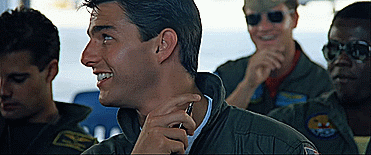
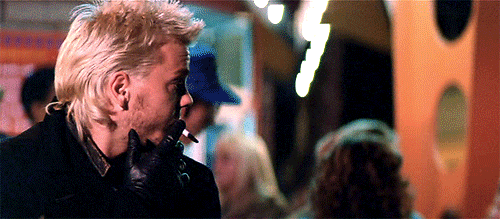
"Damn, what is this place?" The pilot beside me, my good friend and wingman, Maverick, wonders aloud, eyes wide with awe as he looks around the crowded attraction, taking in the huge variety of people around, as well as the odd shops lining the side.
"This, my friend, is the Boardwalk. It's where I spend nearly all my time when I'm off-duty." I inform him, grinning as I lead him through the bodies gathered around the area, gesturing to it as I do so, oddly proud of it, "I traipse the tourist attractions of the Murder Capital of the world."
At my words, he gives me a quizzical look, eyebrow raised in questioning as he adjusts his uniform, the heat making it stick to his skin, as mine is.
"Murder Capital of the world?" The pilot inquires, looking slightly more worried as we push our way along the beachside stretch, my attention on trying to find four particular people.
"Yeah, the Murder Capital." I respond, smirking at him.
"Any particular reason for this name?"
"Well, let's just say this: if all the corpses in Santa Carla were to stand up and continue living, there'd be one hell of a population problem." I explain to him, referencing the words of an old taxidermist I'd met here a little while ago, "Come on, loosen up! You're on holiday!"
I slap his arm lightly, grinning mischievously as he playfully pushes me back, laughing as I throw myself onto his back, gripping on with my arms and legs as he instinctually moves to hold me up, only to start trying to dislodge me seconds later. Giggling, I make sure to hold on tight as he starts rocking from side to side, muscles tensing and loosening under my fingers as he does so, annoying a few people around us. I make a show of clamping on tighter, only to loosen my grip when he suddenly tenses up and stills, head cocked to one side as he regards some newcomers. Following his gaze, I grin brightly as I recognise who it is, climbing off of Maverick with haste, eager to greet them.
"Hey guys! We were just looking for you!" I exclaim as I move over to them, going to throw my arms around Paul, who carefully returns the embrace, before pushing me away a little, ignoring the slightly confused look on my face. I go to Marko and receive the same treatment. Fully expecting it from Dwayne (though not sure why I deserve it) I stand back a little, only to be a little surprised and more reassured when he crushes me against his chest, smiling happily.
"Hey, (Y/n)! How're you?" The dark haired vampire greets, pulling away a little to look into my face.
"Not bad, not bad. How about you guys?" I respond, grinning at him as I step out of his arms, eyeing the others, though they are all preoccupied with something else entirely. Or rather, someone.
"Pretty good, yeah. Who've you brought with you?" He asks, looking up with a smile at Maverick, who stands a little way away, uneasy under the stares of the other vampires.
"This is Maverick. The one in the picture, remember?" I remind him, gesturing for the pilot to come over with a nod of the head, smiling encouragingly at him. Politely, Maverick holds out a hand to Dwayne, waiting for him to shake it.
"It's good to meet you, I've...err, heard a lot about you guys and this place." He supplies, eyeing them nervously.
"Oh? All good, I hope." Dwayne chuckles, being perfectly civil with him, "It's good to finally meet you, too. We've also heard a lot about you."
"You have?" The pilot looks over at me in surprise, eyes locking with mine.
"Don't worry, I never said anything bad." I inform him with a playful wink, grinning at his joking scowl.
"I'm Dwayne, by the way. This is Paul, Marko and David." The dark haired vampire points to each of the others in turn, though their expressions don't change at all as they continue to stare at the pilot, almost hostile.
"Guys? You don't have to scare the hell out of him on his first day here. At least say something." I butt in, looking pointedly at David, who's look at this moment could probably kill Maverick, if that were possible.
"Nice to meet you." The platinum blonde finally growls, extending his hand out for Maverick to shake.
"Err, you too?" The pilot responds, taking the proffered hand, before wincing as David decides to give a show of his superior strength, probably very nearly breaking the bones. The vampire only smiles cynically, blue eyes lit with cruel mirth.
Neither Paul nor Marko say anything, leaving the tension to grow.
"Are you hungry? There are some great food places around here." Dwayne interjects, turning to lead the two of us away from the silent vampires, brown eyes sending me an apology as he does so. Nodding imperceptibly, I follow on, making sure Maverick has fallen into step beside me, feeling bad for him.
"Those are your friends?" He mumbles to me, trying to keep his voice down, though I know full well that they can hear us.
"Yeah."
"They don't say much, do they?"
I laugh at this, knowing this is a new concept for the boys.
"This is new to me. They can never normally shut up." I respond, knowing I'll get in trouble for saying that later.
For the rest of the night, we walk up and down the Boardwalk, going into shops and going on rides, Maverick and Dwayne getting on pretty well, whilst the others do their best to stay as close to me as possible, expressions cold as they watch Maverick and I interact. It's only when we excuse ourselves to find our hotel that they actually say anything.
"See you later, (Y/n)." David promises ominously, eyes betraying exactly what he means as he stares at me intently.
The others corroborate this, completely ignoring Maverick as we walk away, quickly locating the hotel on the main road, where we enter and obtain our room keys.
Finding our rooms, we part ways with a brief farewell, my mind intent on having a shower and getting into bed, though I am well aware that it probably won't happen. Unlocking my room, I enter and drop onto the bed, sighing as I relax against the sheets, tired as hell after the long journey I've had. My rest however, is soon interrupted by the sensation of a hand running down the length of my arm.
Opening my eyes, I swiftly find Marko sat beside me, his doe eyes boring into me as he looks me over.
"Wanna explain yourself, (Y/n)?" Another voice says from a little way away, alerting me to David's presence in the room.
"Explain myself? What for?"
"You and Pilot Guy. What's the big idea?" Paul interjects, sounding annoyed.
"Pilot Guy? You mean Maverick? There's no "big idea", we're friends." I inform them, rolling my eyes.
"Not the impression we got." Marko chips in, narrowing his eyes slightly.
"Oh, I'm sure." I sigh in exasperation, incredulous that they're being like this.
"What's that supposed to mean?" Paul questions, audibly moving closer.
"It means that I think you're being stupid. There's nothing going on between Maverick and I. I'm your mate, remember? Why would I go out with someone else?" I point out, trying not to sound too patronising.
"Watch your tone, kitten." David snaps from across the room, tone annoyed.
"Make me." I return.
#the lost boys#joel schumacher#vampire#david(thelostboys)#kiefer sutherland#paul(the lost boys)#dwayne(the lost boys)#santa carla#marko(the lost boys)#star(the lost boys)
77 notes
·
View notes
Photo
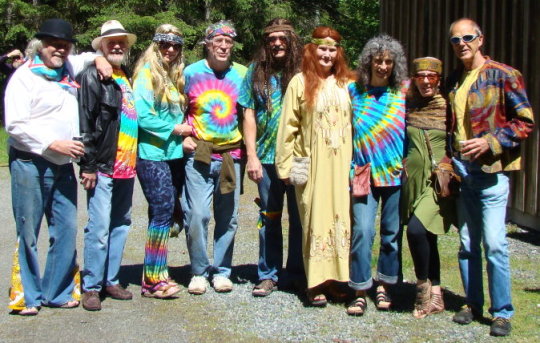
The New Hippies


THE NEW HIPPIES: The work abolition movement, anarcho-primitivism and biodynamism as ways to combat climate change
Essay for the course LOGS13b The Strategic Role of Responsibility in Business by Teppo Saari
Introduction
The course LOGS13b The Strategic Role of Responsibility in Business had the students think about and discuss the various ethical dimensions in business, moral dilemmas and choices to be made that a decision maker in business world come across every day.
This essay is motivated by our case study with a headline ’Investors urge European companies to include climate risks in accounts’ (Financial Times 2020). In this essay I will explore values and ethical principles that I see as the solutions to our case study and climate change in general. This is not to say that I could stand up for them in business world. Ironically, my main thread and leitmotif here is the untransformational nature of capitalism and business world. Thus, standing up to the values I will discuss here means doing less business, not more.
This essay is divided in three parts: problem – reaction – solution. These three parts will talk about the chosen values and ethical principles. They are by no means new: pragmatism – The Golden Rule – parsimony & naturality. They just seem to be in conflict with our modern way of living.
Thinking pragmatically about the problem
As part of our course assignment, we got to read about a group of investors managing trillions of dollars worth of assets who urged European companies to include climate risks in their accounts (Financial Times 2020). Scientists have warned us for decades, that pumping extreme amounts of CO2 into our atmosphere will result in melting of the polar ice caps (Mitchell 1989; Jones & Henderson-Sellers 1990), which will raise the sea level and drown some of the coastal cities (Peters & Darling 1985). Finally, capitalists are acting responsibly!
It would seem that capitalists actually cared for the planet and not just their profits. Or would it? Maybe they are scared of losing their future profits, and this kind of media escapade would bring back public trust and confidence in the system. It would be a sign that capitalists can act transparently, openly, accountably, respecting others (O’Leary 1993). But is changing the allocation in your investment portfolio really a sign of empathy? Would there be other ways to better express empathy in business?
Shareholders are interested in the risk their assets are facing, not necessarily in the welfare of the people. Investors acting virtuously can be just virtue-signaling or pleasing other elements in the society to take off media pressure and negative PR from them in a conformist way (Collinson 2003). Maybe they are just greenwashing their own conscience. Why is George Soros’ climate buzz astroturfing industrial complex (Morningstar 2019a) financing Greta Thunberg to do public PR campaigns targeting the youth? Maybe there is money in it. It is unlikely that it would have been dubbed ”A 100 trillion dollar storytelling campaign” without some particularly good reasons (Morningstar 2019b).
But there is something else in it too than just money: power and control. The person who gets to limit choices gets to dictate what kind of choices remain. And if a person has that kind of foreknowledge, then that person can be two steps ahead of us. And being two steps ahead of us means securing future profits. Including climate risks in accounts will imply controls. Controls are imposed on accounts, but ultimately it will mean controls imposed on people and their daily activities. Workers are the ones who will naturally suffer the consequences of management decisions. In this case management decisions are ’urged’ externally, from the owners’ part. After all, it is the corporations that are producing most of the climate change effects, in terms of pollution and greenhouse gases (Griffin 2017). People doing their jobs, working everyday, producing things but also at the same time producing climate effects. I would still love to hear politicians use more terms such as ”pollution” when talking about these issues. For it is unclear how reducing carbon emissions will reduce overall pollution that is also a contributor in the destruction of our environment (see eg. Bodo & Gimah 2020; Oelofse et al. 2007). Issues like microplastics, holes in the ozone layer, biodiversity loss, acid rains and soil degradation need to be talked about just as much, if not more so.
The problem is simple: too much economic activity producing too much climate impact, mostly pollution and greenhouse gases. Solving the Grand Challenge (Konstantinou & Muller 2020) of our time is harder if we wish to keep the fabric of our society intact. There’s a clear need for dialogue among stakeholders (Gardiner 1996), but how is it a dialogue if people are not actually listened to and don’t get to say how things will progress in society? What I am proposing is a meme-like solution that has the greater impact the more people adopt it. My solution is: stop working. Produce less. Stop supporting systems and mechanisms that produce climate effects. Stop supporting the mechanisms that don’t listen to your voice. Disconnect from the Matrix. Working a dayjob is one of these mechanisms. Although many people have realized the benefits of working from home (Kost 2020), a lot more needs to be done. Remote work is not available to everyone. Not all jobs are remote work.
Bob Black (2021) in his texts has advocated for the total and complete abolition of work. Stopping working naturally does not mean stopping doing things, it will merely mean stopping working a job, a concept which itself is a social construct. Black’s theses are simple but powerful. Working is the source of all ills, it is not compatible with ludic life (allthemore so in 2021), it is forced labour and compulsory production, it is replete with indignities called ”discipline”: ”surveillance, rotework, imposed work tempos, production quotas, punching -in and -out, etc”. Black does not only describe the negative ontological aspects of working, he goes deeper and invokes many familiar names of Greek philosophers:
Both Plato and Xenophon attribute to Socrates and obviously share with him an awareness of the destructive effects of work on the worker as a citizen and a human being. Herodotus identified contempt for work as an attribute of the classical Greeks at the zenith of their culture. To take only one Roman example, Cicero said that “whoever gives his labor for money sells himself and puts himself in the rank of slaves.” His candor is now rare, but contemporary primitive societies which we are wont to look down upon have provided spokesmen who have enlightened Western anthropologists. The Kapauku of West Irian, according to Posposil, have a conception of balance in life and accordingly work only every other day, the day of rest designed “to regain the lost power and health.” Our ancestors, even as late as the eighteenth century when they were far along the path to our present predicament, at least were aware of what we have forgotten, the underside of industrialization. Their religious devotion to “St. Monday” — thus establishing a de facto five-day week 150–200 years before its legal consecration — was the despair of the earliest factory owners. They took a long time in submitting to the tyranny of the bell, predecessor of the time clock. In fact it was necessary for a generation or two to replace adult males with women accustomed to obedience and children who could be molded to fit industrial needs. Even the exploited peasants of the ancient regime wrested substantial time back from their landlord’s work. According to Lafargue, a fourth of the French peasants’ calendar was devoted to Sundays and holidays, and Chayanov’s figures from villages in Czarist Russia — hardly a progressive society — likewise show a fourth or fifth of peasants’ days devoted to repose. Controlling for productivity, we are obviously far behind these backward societies. The exploited muzhiks would wonder why any of us are working at all. So should we.
Black notes that only ”a small and diminishing fraction of work serves any useful purpose independent of the defense and reproduction of the work-system and its political and legal appendages”. In similar vein, the late but great David Graeber saw the futility of most work. Calling this phenomenon ’bullshit jobs’ (Graeber 2018), Graeber sets out to describe what many of us are familiar with: we do useless things to make ourselves feel useful. Because modern society legitimizes itself with having people ’do’ stuff and not ’be’ a certain person. How can you (objectively) measure being? You can’t. But doing, that you can measure. This measurement then qualifies you as a member of society: productive, doing your part (an idiom that is a perfect example how you can’t escape the doing paradigm on a societal level). Graeber’s definition of a bullshit job is: if the position were eliminated, it would make no discernible difference in the world. In many cases these types of jobs are found to be supporting some kind of buraucracy, reporting, assisting decision makers, etc. Our current Matrix has its ways of creating more of these with the clever marketing concept called ’value’ (Petrescu 2019). They don’t make a difference, they create value.
Why would you want to overload the world by doing things that you nor most everyone else see no point in? Why would you waste your time doing pointless things? The easy answer to these questions is ’subsistence’. But there are many other ways to live on this planet. If you keep doing what the society tells you is acceptable or convenient, you will shut your eyes from the problem at hand: climate change.
Legitimizing anarcho-naturism as a solution with The Golden Rule
Our responsibility is to ourselves. We can not properly be held responsible for anything else. Yet the system of representational democracy does just this, holds us collectively responsible for many things, borrows money from creditors with our names on the loan collectively and then makes us pay for the loans. The way this Matrix works is yet another reason to disconnect from it. Or at least stop supporting it as much as possible.
The Golden Rule states: ”Treat others as you want to be treated” (Gensler 2013). From the perspective of climate change, it can first seem curious why you would quit your job and head for the hills. After all, we are facing a global issue here. There are people in need for help and I am running away? But I would see it as a way to get around our predicament. The Golden Rule can be also interpreted in Kantian way as the categorical imperative, particularly its first formulation: ”Act only according to that maxim whereby you can at the same time will that it should become a universal law”. This formulation is somewhat more proactive in nature. It talks about acting, doing things, and doing things is what is appreciated in our society, even when your goal is to exit the society.
Why exit the society? Is it enough to just quit your job and find something else to do, something that is more fulfilling and not bullshit? What an excellent question. Long before the advent of smart phones and 5G and DNA-vaccines, this question had been brought up to the table. In the 1800s, people were realizing the negative impact industrialization was having on society at large. People were rooted out from their family homes in the countryside, forced to move to a large city to look for a job, crammed into small apartments with dozens of other workers, coerced into working long and hard days at factories to make a living. The lowly misery of these people attracted the attention of a certain Friedrich Engels, who felt their situation was not adequate to make up for the suffering they had gone through. He meticulously described the working conditions of the English working class in his ”The Condition of the Working Class in England” (2003 [1845]), originally published in German. Sociology as a science was established by Karl Marx, Max Weber and Emile Durkheim to study these changes. Slowly but surely, the influx of people into cities started to cause issues, something that mayors and other municipal representatives had to start taking care of. Planning and zoning were given a lot more attention, since the earlier modus operandi of old European cities had been rather laissez faire (Sutcliffe 1980).
Against this backdrop of massive societal change, people started to question the changes and their direction. Are we really nothing more than slaves, just working in a different environment? Slavery might not be the right word or context here. Many people believe to be free, govern themselves and their property, and yet their daily actions and options to choose from seem to be eerily limited. They have only so many choices, most of which seem somehow related to running their errands. A more appropriate term, with all its connotations, here would be the Greek word ananke, ”force, constraint, necessity”. Like a force of nature, progress towards modernity necessitates that people leave their family homes and go work in large factories, compulsively manufacturing endless amounts of products, some of which are necessary, others merely decorations, and some just pointless.
Many names in 19th century New England worked upon a vision for the future society at a time when unprecedented changes were taking place and the standard of living was rising faster than ever before. The Transcendental Club was a group of New England authors, philosophers, socialists, politicians and intellectuals of the early-to-mid-19th century which gave rise to Transcendentalism, the first notable American intellectual movement. Transcendentalist believe in the inherent goodness of people and nature, but that society and its institutions — particularly organized religion and political parties — corrupt the purity of the individual. (Stanford Encyclopedia of Philosophy 2003; Sacks 2003.) Transcendentalism is a unique mix of European Romanticism, German (particularly Kantian) philosophy, and American Christianity. The impact of this movement can still be seen in the many flavours of American anarchist and radical Christian movements.
Out of the ranks of Transcendentalists rose a couple of names that can be viewed as the progenitors of modern anarcho-primitivism and natur(al)ist anarchy. Ralph Waldo Emerson was the central figure of the Transcendental Club, who together with Henry David Thoreau critiqued the contemporary society for its ”unthinking conformity” and advocated for “an original relation to the universe” (Stanford Encyclopedia of Philosophy 2003). Emerson’s Nature (2009 [1836]) poetically embellishes our view of the natural world, while Thoreau’s Walden; or, Life in the Woods (1995 [1854]) is a call for civil disobedience and revolt against the modern world. Another influential natur(al)ist writer has been Leo Tolstoi whose name is frequently mentioned by anarchists. Tolstoi himself was a Christian and pacifist, and his writings have inspired Christian anarcho-pacifism that views the state as ”immoral and unsupportable because of its connection with military power” (Stanford Encyclopedia of Philosophy 2017).
Before the Transcendentalist movement, Europe experienced similar trend in philosophy with Jean-Jacques Rousseau’s natural philosophy. Rousseau touched upon many subjects: freedom, free will, authority, nature, morality, societal inequality, representation and government. Like Transcendentalists, Rousseau held a belief that human beings are good by nature but are rendered corrupt by society. ”Rousseau clearly states that morality is not a natural feature of human life, so in whatever sense it is that human beings are good by nature, it is not the moral sense that the casual reader would ordinarily assume” (Stanford Encyclopedia of Philosophy 2010). Rousseau’s work is relevant to many of the social movements that currently fight against COVID restrictions, vaccination agenda, building of 5G antenna towers next to where people live, polluting the environment, systemic poverty and general disconnection from the natural world. Rousseau, although regarded as a philosopher, saw philosophy itself negatively, and to him philosophers were ”the post-hoc rationalizers of self-interest, as apologists for various forms of tyranny, and as playing a role in the alienation of the modern individual from humanity’s natural impulse to compassion” (Stanford Encyclopedia of Philosophy 2010).
Rousseau’s days did not see capitalism as we see it now. It was later Marx (influenced by Hegel, who in turn was influenced by Rousseau) that put together a treatise that considers the societal change we have seen ever since from industrialism and circulation of capital. But Rousseau’s thoughts about the social contract (1968 [1762]), “child-centered” education (Rousseau 2010), and inequality (Graeber & Wengrow 2018; Rousseau 2008) are still relevant today. Especially when we are faced with many societal forces that are contradictory in nature, each of them pushing us into certain direction, demanding our attention, wanting us to change our beliefs about that one particular aspect that connects with other aspects and forms the Matrix of our reality.
We are once again facing a similar situation as the people did back in the days of the first industrial revolution. Now the industrial revolution has reached its fourth cycle, unimaginatively called ”Industry 4.0” (Marr 2018; WEF 2021), where machines are starting to become autonomous and talk to each other. I used to think technology was cool, and went to work for Google. But at Google I learned that technology is not cool, after all. Not until technology becomes completely open source, it will be used by massive conglomerates to build autonomous weapons systems (Cassella 2018; Johnson 2018) and the industry will keep paying ethics researchers to keep writing arguments for them (Charters 2020). Even though I could work for an industry that, given the current trajectory, will be among the biggest producers of CO 2 in the future Vidal 2017), the idea that I would work for an industry that sees weaponizing their products as the grandest idea of mankind’s future is still gnawing.
Because, it is all just business (Huesemann & Huesemann 2011):
One of the functions of critical science is to create awareness of the underlying values, and the political and financial interests which are currently determining the course of science and technology in industrialized society. This exposure of the value-laden character of science and technology is done with the goal of emancipating both people and the environment from domination and exploitation by powerful interests. The ultimate objective is to redirect science and technology to support both ordinary people and the environment, instead of causing suffering through oppression and exploitation by dominant elites. Furthermore, by exposing the myth of the value-neutrality of science and technology, critical science attempts to awaken working scientists and engineers to the social, political, and ethical implications of their work, making it impossible or, at the very least, uncomfortable for them to ignore the wider context and corresponding responsibilities of their professional activities.
It all seems to be connected with state imperialism and the military-industrial(-intelligence) complex. Lenin’s statement (2008 [1916]) equating capitalism with imperialism still prevails this day: ”imperialist wars are absolutely inevitable under such an economic system, as long as private property in the means of production exists”. The conditions change, but the war machine keeps on churning (soon with autonomous weapons!), with wealthy but crooky investors financing projects that are even more dystopian (Byrne 2013). We may remember what president Dwight D. Eisenhower said about the military- industrial complex (NPR 2011):
”In the councils of government, we must guard against the acquisition of unwarranted influence, whether sought or unsought, by the military-industrial complex. The potential for the disastrous rise of misplaced power exists, and will persist.”
It is exactly these kinds of doomsday scenarios that inspire people like Theodore John ”The Unabomber” Kaczynski. Kaczynski, famous for sending mail bombs to various university professors around the US, holds a doctoral degree in mathematics. (Wikipedia 2021.) Kaczynski was bullied as a child, and it has been suggested that he was part of an MKULTRA experiment in college (The Week 2017). Kaczynski did not send his bombs haphazardly. He wrote long theoretical pieces to justify his actions, most of them being thematically anarcho-primitivist. In 1995, after sending several bombs to university personnel and business executives in 1978-1995, he said to ”desist from terrorism” if he got his text published in media outlets.
In his Industrial Society and Its Future (Kaczynski 1995), a 35 thousand word essay published in The Washington Post, which the FBI gave the name ”Unabomber manifesto”, Kaczynski attributes many our societal ills to ”leftism”. In the manifesto Kaczynski details how two psychological tendencies, “feelings of inferiority” and “oversocialization”, form the basis of ”the psychology of modern leftism”. Feelings of inferiority are taken to mean the whole spectrum of negative feelings about self: low self-esteem, feelings of powerlessness, guilt, self-hatred etc. Oversocialization is the process of socialization taken to extreme levels:
24. Psychologists use the term “socialization” to designate the process by which children are trained to think and act as society demands. A person is said to be well socialized if he believes in and obeys the moral code of his society and fits in well as a functioning part of that society. It may seem senseless to say that many leftists are over-socialized, since the leftist is perceived as a rebel. Nevertheless, the position can be defended. Many leftists are not such rebels as they seem.
25. The moral code of our society is so demanding that no one can think, feel and act in a completely moral way. For example, we are not supposed to hate anyone, yet almost everyone hates somebody at some time or other, whether he admits it to himself or not. Some people are so highly socialized that the attempt to think, feel and act morally imposes a severe burden on them. In order to avoid feelings of guilt, they continually have to deceive themselves about their own motives and find moral explanations for feelings and actions that in reality have a nonmoral origin. We use the term “oversocialized” to describe such people.
Kaczynski goes on to describe how this oversocialization causes a person to feel guilt and shame for their actions, especially in the context of performing as society expects them to perform. He writes how this concept of oversocialization is used to determine ”the direction of modern leftism”. Further on, Kaczynski describes how modern man needs goals to strive for, to not run the risk of developing serious psychological problems. This goalsetting activity he denotes ”power process”. But these goals can be real or artificial. Setting a goal is “surrogate activity” if the person devotes much time and energy to attaining it, does not attain it, and still feels seriously deprived. It is just a goal for goalsetting’s sake, the unfulfilled other side of the coin of power process. Kaczynski then connects these concepts to the many societal ills (excessive density of population, isolation of man from nature, excessive rapidity of social change and the breakdown of natural small-scale communities such as the extended family, the village or the tribe) by describing how modern society, with all its marketing and advertising creating artificial needs, disrupts the power process, mankind’s search for itself and meaning-making in life. He sees social hierarchies and the need to climb up them, the ”keeping up with the Joneses”, as surrogate activity.
”Because of the constant pressure that the system exerts to modify human behavior, there is a gradual increase in the number of people who cannot or will not adjust to society’s requirements: welfare leeches, youth gang members, cultists, anti-government rebels, radical environmentalist saboteurs, dropouts and resisters of various kinds”. This gradual increase, then, the system tries to ’solve’ by using propaganda, ”to make people WANT the decisions that have been made for them”. In regards to technology, the ”bad” parts cannot be separated from the ”good”, and thus we are constantly facing the dilemma between technology and freedom, new technology being introduced all the time, and new regulations being introduced to curb the negative effects of the technology and at the same time stripping us of our freedoms. Kaczynski concludes, that revolution is easier than reforming the system.
Later, Kaczynski released another of his anti-technological theses. In Anti-Tech Revolution: Why and How (2015) Kaczynski presents a ”comprehensive historical analysis explaining the futility of social control and the catastrophic influence of technological growth on human social and planetary ecological systems.” This time Kaczynski talks more about how to start an anti-tech movement and how to keep it going. The text reads like a mathemathical proof of sorts, it presents ”rules”, ”propositions” and ”postulates” why the technological system will destroy itself (eg. Russell’s Paradox resulting in chaos in a highly complex, tightly coupled system) and why a successful anti-tech movement needs clear goals to avoid some of the errors revolutionary movements have made, which are elaborated in the book. Violence is not offered as a solution in the book, it is seen more like a mishap of sorts, a suboptimal outcome of a revolutionary movement. But it talks about power. Kaczynski got to learn the hard way how the feeling of powerlessness breeds desperate actions that would have been otherwise unnecessary. The book also talks about climate change and related issues, from a mathematic systems theoretical point of view.
Institutions that are in the business of social engineering and behavioral modification, such as the Tavistock Institute in the UK or the CIA in the US, would have us believe that Kaczynski’s actions were ”defences against anxiety” that can be seen as ”withdrawal, informal organization, reactive individualism and scapegoating” (Hills et al. 2020), and to some extent this is true. But Kaczynski interprets the actions of these institutions stemming from technological progress in our society Kaczynski 1995):
117. In any technologically advanced society the individual’s fate MUST depend on decisions that he personally cannot influence to any great extent. A technological society cannot be broken down into small, autonomous communities, because production depends on the cooperation of very large numbers of people and machines. Such a society MUST be highly organized and decisions HAVE TO be made that affect very large numbers of people.
This uniformity of a large hierarchical modern society then forces its will on people (Kaczynski 1995):
119. The system does not and cannot exist to satisfy human needs. Instead, it is human behavior that has to be modified to fit the needs of the system. This has nothing to do with the political or social ideology that may pretend to guide the technological system. It is not the fault of capitalism and it is not the fault of socialism. It is the fault of technology, because the system is guided not by ideology but by technical necessity.
We have once again encountered ananke, necessity. Now, if we consider ourselves as the lonely decision makers in this society, what could we do? We can try and fight fire with fire, but such fights end up producing only pain and casualties (Taylor 2013). Anarcho-naturists and anarcho-pacifists understand that (unnecessary) fighting in most cases does not work. Sometimes fighting is warranted, but it is beyond the scope of this essay to examine those cases. Sending bombs to people’s offices may get you some attention and even make somebody quote your manifesto in an essay, but it is not solving the issue, something which the Unabomber addressed in his later texts. If working a job indirectly supports the military-industrial complex NewScientist 2011), what good does it do? The military-industrial complex is the biggest source of pollution in the world (The Conversation 2019; Acedo 2015), detaching yourself from this complex is imperative. Even if they would manage to convince us with their psyops that they are willing to change and that climate change is an important issue (Ahmed 2014), it would still be the biggest polluter that is controlling the conversation. It has even been suggested that they are behind this climate buzz (Light 2014). Is your job doing that much good in society that it outweighs the cons? If I need to act responsibly, but cannot fight the system nor conform, while at the same time keeping in mind our looming climate disaster, the only reasonable and peaceful response is to exit the system altogether.
Biodynamism’s naturality and parsimony
Owning responsibility and transforming the world implies taking some kind of action. We have already seen how feelings of powerlessness and lack of self-worth can lead to destructive actions. But there are an unlimited amount of actions that can be taken, that are not based in feelings of powerlessness but empowerment.
Exiting society might sound like a lonely project, and some people might rightfully feel lonely when all their peers still want to live in the illusion. But it does not have to be so. A lot of soul-searching needs to be done, and that is usually done in privacy, focusing upon oneself, but beyond that there are ways how to go off-grid and drastically reduce your carbon emissions.
One of the key concepts that will be our guiding principle here is degrowth (Paulson 2017), which ties into values such as organicity, naturality and parsimony. We will want to have less production of artificial things, and more organic and natural things. By artificial we mean long supply chains and many phases of production with modern high technology that produce a large amount of climate effects. By natural we mean using primitive technology, mostly all-natural or recycled materials and something that can be produced even alone, given enough time. Primitive technology does not exclude electricity, it just means producing it differently.
Rudolf Steiner, Austrian philosopher, social reformer, architect, and theosophist, the founder of Anthroposophy and a great reformer of science in matters of spirit, started the first intentional form of organic farming, known as biodynamic agriculture, after he had given a series of lectures on the topic in the last year of his life. (Paull 2011.) Steiner had many spiritual experiences during his life, which lead him to start the Anthroposophy movement. He wanted to apply the scientific process into spiritual realm, inquiring it as it would be as real as our material world. Inquiring this spiritual world helped him access knowledge he claims to not have been access otherwise (Steiner 2011 [1918]). Anthroposophist self-inquiry can be seen as Foucauldian ”technology of the self” that ”provide an intervention mechanism on the part of active subjects, injecting an element of contingency to everyday encounters and alleviating the determinist effect that technologies of power would have otherwise” (Skinner 2012).
Steiner’s thoughts about agriculture are still relevant (Paull 2011):
In 1924 Steiner commented that, “Nowadays people simply think that a certain amount of nitrogen is needed for plant growth, and they imagine it makes no difference how it’s prepared or where it comes from” Steiner, 1924b, pp.9-10). He made the point that, “In the course of this materialistic age of ours, we’ve lost the knowledge of what it takes to continue to care for the natural world” (Steiner, 1924b, p.10).
Our current system seems to think exactly in this way, that if we just compensate our wreaked havoc by investing in ’green’ technology (Elegant 2019), it will all be ok and rainbows in the sky. But it will not. No one is even double checking if the companies that say that they are now carbon neutral actually proactively try to make our world greener. They can just buy a renewable energy company and say now we are green and do nothing else. Some would argue that going ’carbon neutral’ like these massive corporations are doing it is not the way to do it: “’green’ infrastructures are creating conflict and ecological degradation and are the material expression of climate catastrophe” (Dunlap 2020).
Steinerian biodynamism ”encompasses practices of composting, mixed farming systems with use of animal manures, crop rotations, care for animal welfare, looking at the farm as an organism/entity and local distribution systems, all of which contribute toward the protection of the environment, safeguard biodiversity and improve livelihoods of farmers” (Turinek et al. 2009). While modern biodynamic studies focus on agroecological factors such as nutrient cycles, soil characteristics, and nutritional quality (Reganold 1995; Droogers & Bouma 1996), Steiner himself was quite metaphysical in his lectures and paid attention to details such as kingdoms of nature, planetary influences, biorhythms, incarnated and environmental ethers, and the Zodiac (Steiner 2004 [1958]; Nastati 2009).
By shifting to more natural ways of living, we may help Gaia (Lovelock 1991; Singh 2007) heal in many other ways than just reduce our climate emissions. By realizing that we are actually living on the skin of a fairly large and complex organism, we will stop treating it as a plain source of material resources, and start bonding with it, tune into its consciousness and establish two-way communication, just like the natives have done in America.
The way of the natives ought to be our current way, since there is no reason why the natives could not guard the lands they have before. One of the greatest fears of people speaking for private property rights is that managing resources collectively would mean exhausting them. There is no Tragedy of Commons. Just because you are materially poor does not mean that you are any less competent steward of land and wealth, as proposed by Elinor Oström (2009). Acting for climate is not an investment allocation problem. The natives need their land back so that they could do their best to fight the destruction of our ecosystem. The Outokumpu supply chain in Brazilian rainforests, Elon Musk and Bolivian lithium mines, Papua New Guinea indigenous conflict, mining in Lapland in traditional Sami herding areas, Australian uranium mining in indigenous lands… these are all pointless conflicts.
There are also many other ways of staying grounded and in touch with nature, while at the same time cultivating sovereignty. Many of these things revolve around feeding the most immediate community next to you. They reflect ideas such as mutuality, solidarity, organicity, and naturality. Permaculture is a term coined by David Holmgren to describe ”an approach to land management and philosophy that adopts arrangements observed in flourishing natural ecosystems. It includes a set of design principles derived using whole systems thinking. It uses these principles in fields such as regenerative agriculture, rewilding, and community resilience” (Wikipedia: Permaculture 2021). Permaculture has many branches including ecological design, ecological engineering, regenerative design, environmental design, and construction. It also includes integrated water resources management that develops sustainable architecture, and regenerative and self-maintained habitat and agricultural systems modeled from natural ecosystems (Holmgren Desing Services 2007).
Earthships are 100% sustainable homes that are both energy efficient and modern. Earthsips are built with natural and repurposed (recycled) materials, they heat and cool themselves without electric heat, they use solar energy to power electric appliances, they collect all of their water from rain and snowmelt, they re-use their sewage water to fertilize plants, and there’s an indoor garden that grows food in vertical growing spaces (Reynolds 2021). Ecovillages are a ”human-scale, full-featured settlement, in which human activities are harmlessly integrated into the natural world in a way that is supportive of healthy human development and can be successfully continued into the indefinite future” (Gilman & Gilman 1991).
Clifford Harper had a set of drawings imagining an alternative in his book Radical Technology (Harper & Boyle 1976). In them, he shows many of the ideas that were themes in the German garden city movement in the beginning of 20th century (Bollerey & Hartmann 1980), such as collectivised gardens, autonomous housing estates, and community workshops. The book introduces us ’radical technology’, which spans basically all of the concepts we have discussed up to this point: organic agriculture, biodynamic agriculture, vegetarianism, hydroponics, soft energy, insulation, low-cost housing, tree houses, shanty houses, ’folk-built’ houses using traditional methods, houses built from subsoil, self-built houses, housing associations, solar dwellings, domestic paper-making, carpentry, scrap reclamation, printing, community & pirate radio, collectivised gardens, collective workshops for clothesmaking, shoe repair, pottery, household decoration and repairs, autonomous housing estates, autonomous rural villages, etc.
These concepts, while they seem simple, are still empowering, they are meant to let people enjoy they fruits of their labour. Last but certainly not least is the concept that all of these things fall under, alternative (or, appropriate) technology. Alternative technologies are those ”which offer genuine alternatives to the large-scale, complex, centralized, high-energy life forms which dominate the modern age” (Winner 1979). Alternative technologies seek to solve the problems technocentric thinking has caused in society: technical scale and economic concentration, level of complexity or simplicity best suited to technical operations of various kinds, division of labor and its alleged necessity, social and technical hierarchy as it relates to the design of technological systems, and self-sufficiency and interdependence regarding the lives of individuals and communities. Many of these solutions have been developed in Africa, where problems have had to be solved, but resources have been scarce in actuality.
Appropriate technology holds great promise in ways that are currently underappreciated in our society (Huesemann & Huesemann 2011):
As has been mentioned repeatedly throughout this book, the primary goal of technology in our current economic system is to increase material affluence and to generate profits for the wealthy by controlling and exploiting both people and the environment. In view of the reality of interconnectedness, this is neither environmentally sustainable nor socially desirable. In this chapter we discuss how to design technologies which reflect the values of environmental sustainability and social appropriateness. We also emphasize the importance of heeding the precautionary principle in order to prevent unintended consequences, as well as the need for participatory design in order to ensure greater democratic control of technology. Finally, as a specific example of an environmentally sustainable and socially appropriate technology, we discuss the positive contribution of local, organic, small-scale agriculture.
Conclusion
This essay has presented the reader with ramblings of a person who is familiar with Critical Theory, who would like to build a stronger connection to nature, and who is having a major identity crisis in life. I have expressed, albeit feebly, my will to emancipate myself, to exit the Matrix. In Finnish they would say ”Sota ei yhtä miestä kaipaa”, and in George S. Patton’s words this expression would be ”Hell, they won’t miss me, just one man in thousands.”
In this essay I seem to have extensively quoted the Unabomber manifesto. This is not to say that Kaczynski had exceptionally good motives or justifications for his actions. He killed many people and is in prison now. Kaczynski’s ideas are not unique. Quoting his manifesto serves merely to prove one point: he is the product of his environment. Mental illness is no longer a taboo and things have progressed somewhat since Kaczynski’s days. It could be argued that Kaczynski’s writings were just projection of his own feelings of shame and guilt he had gone through. But his mental condition, should he be diagnosed with one (Amador & Reshmi 2000), does not invalidate the things he’s written. In many ways his writings are now more relevant than ever. When we have tech billionaires talking about inserting neuralinks into your brain and downloading thoughts straight from the headquarters, we can really see the manifesto dots connecting.
I wish it would have been just the mental load caused by a ’surrogate activity’ of keeping up with the Joneses that was the cause of all this, but no, it’s the real deal now. When we have corporate executives and federal commissions defending autonomous weapons systems and saying building such systems is a ’moral imperative’ (Gershgorn 2021), you know we have reached peak civilization. It’s all downhill from now on. All participation in society will support this moral imperative, and I don’t want to have anything to do with it. While many would get back to nature for reasons of convenience, such as better health, Rousseau himself would have gotten back to nature ”to feel God in nature” (LaFreniere 1990). It is this kind of humanist transcendentalism (not transhumanism) that we will need again, to realize what we have done to our planet, to realize what needs to be done to abolish the war machine consuming it, and to make ourselves whole again.
References
Acedo, A. (2015) Change the Military-Industrial Complex, not the Climate. Latin America in movement. <https://www.alainet.org/en/articulo/172152>, accessed 15.3.2021.
Ahmed, N. (2014) The age of climate warfare is here. The military-industrial complex is ready. Are you? The Guardian. <https://www.theguardian.com/environment/earth- insight/2014/may/30/climate-change-war-conflict-military-industrial-complex-syria-egypt-uprising>, accessed 15.3.2021.
Amador, X. F. – Reshmi, P-O. (2000) Defending the Unabomber: Anosognosia in Schizophrenia. Psychiatric Quarterly, 71 (4), 363-71.
Black, B. (2021) The Abolition of Work. <https://theanarchistlibrary.org/library/bob-black-the-abolition-of-work/>, accessed 13.3.2021.
Bodo, T. – Gimah, B. G. (2020) The Pollution and destruction of the Niger Delta ecosystem in Nigeria: Who is to be blamed? European Scientific Journal, 16 (5), 161-182.
Bollerey, F. – Hartmann, K. (1980) A patriarchal utopia: the garden city and housing reform in Germany at the turn of the century. In: Sutcliffe, A. (ed.) The rise of modern urban planning 1800-1914, 135-164. Mansell, London.
Byrne, J. A. (2013) Influential economist says Wall Street’s full of ‘crooks’. New York Post. <https://nypost.com/2013/04/28/influential-economist-says-wall-streets-full-of-crooks/>, accessed 14.3.2021.
Cassella, C. (2018) Thousands of Google Employees Are Worried Their Company Will Help Create Autonomous Weapons. Science Alert. <https://www.sciencealert.com/google-employees-resign-military-ai-project-regulation-ethical-standards>, accessed 14.3.2021.
Charters, D. (2020) Killing on Instinct: A Defense of Autonomous Weapon Systems for Offensive Combat. Viterbi Conversations in Ethics. <https://vce.usc.edu/volume-4-issue-1/killing-on-instinct-a-defense-of-autonomous-weapon-system-for-offensive-combat/>, accessed 14.3.2021.
Collinson, D. L. (2003) ‘Identities and insecurities: selves at work’. Organization, 10 (3), 527-547.
Droogers, P. – Bouma, J. (1996) Biodynamic vs. conventional farming effects on soil structure expressed by simulated potential productivity. Soil Science Society of America Journal, 60 (5), 1552-1558.
Dunlap, A. (2020) Bureaucratic land grabbing for infrastructural colonization: renewable energy, L’Amassada, and resistance in southern France. Human Geography, 13 (2).
Elegant, N. X. (2019) The Internet Cloud Has a Dirty Secret. Fortune. <https://fortune.com/2019/09/18/internet-cloud-server-data-center-energy-consumption-renewable-coal/>, accessed 16.3.2021.
Engels, F. (2003 [1845]) The condition of the working class in England. Am J Public Health, 93 (8), 1246-9.
Emerson, R. W. (2009 [1836]) Nature. <https://www.gutenberg.org/files/29433/29433-h/29433-h.htm>, accessed 14.3.2021.
Financial Times (2020) Investors urge European companies to include climate risks in accounts. <https://www.ft.com/content/dd01aacd-85a0-4577-9700-26f1d6fb26b3>, accessed 13.3.2021.
Gardiner, M. (1996) Foucault, ethics and dialogue. History of the Human Sciences, 9 (3), 27-46.
Gensler, H. J. (2013) Ethics and the golden rule. Routledge.
Gershgorn, D. (2021) Federal Commission Says Developing Autonomous Weapons Is a ‘Moral Imperative’. OneZero. <https://onezero.medium.com/federal-commission-says-developing-autonomous-weapons-is-a-moral-imperative-9effcc4c0692>, accessed 16.3.2021.
Gilman, R. – Gilman, D. (1991) Eco-Villages and Sustainable Communities, a Report for Gaia Trust. Context Institute, Bainbridge Island, Washington.
Graeber, D. (2018) Bullshit Jobs: A Theory. <https://theanarchistlibrary.org/library/david-graeber-bullshit-jobs.pdf>, accessed 13.3.2021.
Graeber, D. – Wengrow, D. (2018) How to change the course of human history. Eurozine. <https://www.eurozine.com/change-course-human-history/>, accessed 19.3.2021.
Griffin, P. (2017) The Carbon Majors Database: CDP Carbon Majors Report 2017. <http://climateaccountability.org/pdf/CarbonMajorsRpt2017%20Jul17.pdf>, accessed 13.3.2021.
Harper, P. – Boyle, G. (1976) Radical Technology – Food and Shelter, Tools and Materials, Energy and Communications, Autonomy and Community. Pantheon Books, USA.
Hills, D. – Allen, R. – Drabble, D. (2020) TIHR-2 – Systems thinking at the Tavistock Institute – past, present and future. <https://www.tavinstitute.org/projects/systems-thinking-at-the-tavistock-institute-past-present-and-future/>, accessed 15.3.2021.
Holmgren Design Services (2007) Essence of Permaculture. <https://www.transitionmonty.org/uploads/6/5/4/9/6549206/essence_of_pc_ebook_1.pdf>, accessed 18.3.2021.
Huesemann, M. H. – Huesemann, J. A. (2011) Technofix: Why Technology Won’t Save Us or the Environment. New Society Publishers, Gabriola Island, British Columbia, Canada.
Jones, M. D. H. – Henderson-Sellers, A. (1990) History of the greenhouse effect. Progress in physical geography, 14 (1), 1-18.
Johnson, K. (2018) Google’s AI chief on AutoML, autonomous weapons, and the future. VentureBeat. <https://venturebeat.com/2018/05/09/googles-ai-chief-on-automl-autonomous-weapons-and-the-future/>, accessed 14.3.2021.
Kaczynski, T. J. (1995) Industrial Society and Its Future. <http://editions-hache.com/essais/pdf/kaczynski2.pdf>, accessed 14.3.2021.
Kaczynski, T. J. (2015) Anti-Tech Revolution: Why and How. <https://archive.org/details/KaczynskiAntiTechRevolutionWhyAndHow_201803/>,accessed 15.3.2021.
Konstantinou, E. – Muller, R. (2020) More than a list: The Grand Challenges approach and legitimate agents of social change. In: Proceedings of the British Academy of Management (BAM) Conference in the Cloud, September 2-4, 2020.
Kost, E. (2020) How the remote workforce is fighting climate change. <https://www.freelancer.com/articles/starting-your-business/the-remote-workforce-and-climate-change>, accessed 13.3.2021.
LaFreniere, G. F. (1990) Rousseau and the European Roots of Environmentalism. Environmental History Review, 14 (4), 41-72.
Lenin, V. I. (2008 [1916]) Imperialism, the Highest Stage of Capitalism. <https://www.marxists.org/archive/lenin/works/1916/imp-hsc/imperialism.pdf>, accessed 14.3.2021.
Lovelock, J. (1991) Healing Gaia: Practical Medicine for the Planet. Gaia Books Ltd., UK.
Light, S. (2014) Valuing National Security: Climate Change, the Military, and Society. UCLA Law Review, 61, 1772-1812.
Marr, B. (2018) What is Industry 4.0? Here’s A Super Easy Explanation For Any-one. Forbes, Sep 2, 2018. <https://www.forbes.com/sites/bernardmarr/2018/09/02/what-is-industry-4-0-heres-a-super-easy-explanation-for-anyone/?sh=5b60d0af9788>, accessed 14.3.2021.
Mitchell, J. F. (1989) The “Greenhouse” effect and climate change. Reviews of Geo-physics, 27 (1), 115-139.
Morningstar, C. (2019a) The Manufacturing of Greta Thunberg For Consent: A Design to Win — A Multi-Billion Dollar Investment [VOLUME II, ACT I]. <http://www.wrongkindofgreen.org/2019/09/11/the-manufacturing-of-greta-thunberg-for-consent-volume-ii-act-i-a-design-to-win-a-multi-billion-dollar-investment/>, accessed 13.3.2021.
Morningstar, C. (2019b) A 100 trillion dollar storytelling campaign. <http://www.wrongkindofgreen.org/2019/10/06/a-100-trillion-dollar-storytelling-campaign/>, accessed 13.3.2021.
Nastati, E. (2009) Commentary on Dr Rudolf Steiner’s Agriculture Course. Mark Moodie Publications, UK.
NewScientist (2011) Revealed – the capitalist network that runs the world. <https://www.newscientist.com/article/mg21228354-500-revealed-the-capitalist-network-that-runs-the-world/>, accessed 14.3.2021.
NPR (2011) Ike’s Warning Of Military Expansion, 50 Years Later. <https://www.npr.org/2011/01/17/132942244/ikes-warning-of-military-expansion-50-years-later>, accessed 14.3.2021.
O’Leary, P. (1993) Ethical attentiveness. Studies in Philosophy and Education, 12 (2-4), 139-151.
Oelofse, S. H. H. – Hobbs, P. J. – Rascher, J. – Cobbing, J. E. (2007) The pollution and destruction threat of gold mining waste on the Witwatersrand: A West Rand case study. In: 10th International Symposium on Environmental Issues and Waste management in Energy and Mineral Production (SWEMP, 2007), Bangkok, 11-13.
Oström, E. (2009) A General Framework for Analyzing Sustainability of Social-Ecological Systems. Science, 325.
Paull, J. (2011) Attending the First Organic Agriculture Course: Rudolf Steiner’s Agriculture Course at Koberwitz, 1924. European Journal of Social Sciences, 21 (1), 64-70.
Paulson, S. (2017) Degrowth: culture, power and change. Journal of Political Ecology, 24 (1), 425-448.
Peters, R. L. – Darling, J. D. S. (1985) The Greenhouse Effect and Nature Reserves. BioScience, 35 (11), 707-717.
Petrescu, M. (2019) From marketing to public value: towards a theory of public service ecosystems. Public Management Review, 21 (11), 1733-1752.
Reganold, J. P. (1995) Soil quality and profitability of biodynamic and conventional farming systems: A review. American Journal of Alternative Agriculture, 36-45.
Reynolds, M. (2021) Design Principles – Earthsip Biotecture. <https://www.earthshipglobal.com/design-principles>, accessed 18.3.2021. <https:Rousseau, J-J. (1968 [1762]) The Social Contract. Translated by Maurice Cranston. Penguin Books, Hammondsworth.
Rousseau, J-J. (2008 [1754]) Discourse on the Origin of Inequality. A Discourse on a Subject Proposed by the Academy of Dijon: What is the Origin of Inequality Among Men, and is it Authorised by Natural Law? <https://www.academia.edu/download/61519662/5019_Rousseau_Discourse_on_the_Origin_of_Inequality20191215-105020-65l66a.pdf>, accessed 18.3.2021.
Rousseau, J. J. (2010) Emile, or, on education: Includes Emile and Sophie, or, the solitaries (The Collected writings of Rousseau, Vol. 13). Translated and edited by Christopher Kelly and Allan Bloom. University Press of New England, London.
Sacks, K. S. (2003) Understanding Emerson: ”The American scholar” and his struggle for self-reliance. Princeton University Press.
Singh, R. P. B. (2007) Gaia and Ecological A Wakening: Message of Hinduism for Deeper Understanding. The Oriental Anthropologist, 7 (2), 213-233.
Skinner, D. (2012) Foucault, subjectivity and ethics: towards a self-forming subject. Organization, 20 (6), 904–923.
Stanford Encyclopedia of Philosophy (2003) Transcendentalism. <https://plato.stanford.edu/entries/transcendentalism/>, accessed 14.3.2021.
Stanford Encyclopedia of Philosophy (2010) Jean Jacques Rousseau. <https://plato.stanford.edu/entries/rousseau/>, accessed 18.3.2021.
Stanford Encyclopedia of Philosophy (2017) Anarchism. <https://plato.stanford.edu/entries/anarchism/>, accessed 14.3.2021.
Steiner, R. (2004 [1958]) Agriculture Course: The Birth of the Biodynamic Method. Translated by George Adams. Rudolph Steiner Press, UK.
Steiner, R. (2011 [1918]) Knowledge of the Higher Worlds and Its Attainment. <http://logoilibrary.com/wp-content/uploads/2019/07/A-Knowledge-Of-The-Higher-Worlds.pdf>, accessed 16.3.2021.
Sutcliffe, A. (Ed.) (1980) The rise of modern urban planning, 1800-1914 (Vol. 1). Mansell, UK.
Taylor, B. (2013) Religion, Violence and Radical Environmentalism: From Earth First! to the Unabomber to the Earth Liberation Front. In Muddle, C. (ed.) Political Extremism, vol. IV. Sage Publications.
The Conversation (2019) US military is a bigger polluter than as many as 140 countries – shrinking this war machine is a must. <https://theconversation.com/us-military-is-a-bigger-polluter-than-as-many-as-140-countries-shrinking-this-war-machine-is-a-must-119269>, accessed 15.3.2021.
The Week (2017) MKUltra: Inside the CIA’s Cold War mind control experiments. <https://www.theweek.co.uk/86961/mkultra-inside-the-cias-cold-war-mind-control-experiments>, accessed 14.3.2021.
Thoreau, H. D. (1995 [1854]) Walden; or, Life in the Woods. <https://www.gutenberg.org/files/29433/29433-h/29433-h.htm>, accessed 14.3.2021.
Turinek, M. – Grobelnik-Mlakar, S. – Bavec, M. – Bavec, F. (2009) Biodynamic agriculture research progressand priorities. Renewable Agriculture and Food Systems, 24 (2), 146–154.
WEF (2021) Centre for the Fourth Industrial Revolution. <https://www.weforum.org/reports/health-and-healthcare-in-the-fourth-industrial-revolution-global-future-council-on-the-future-of-health-and-healthcare-2016-2018>, accessed 14.3.2021.
Wikipedia (2021) Ted Kaczynski. <https://en.wikipedia.org/wiki/Ted_Kaczynski>, accessed 14.3.2021.
Winner, L. (1979) The Political Philosophy of Alternative Technology: Historical Roots and Present Prospects. Technology In Society, 1, 75-86.
https://kapitaali.com/the-new-hippies/
#anarcho-primitivism#Anti-technology#naturalism#parsimony#pragmatism#Ted Kaczynski#The Golden Rule#Unabomber#Sekalainen
15 notes
·
View notes
Text
Voluptas Noctis Aeternae {Part 3.4}
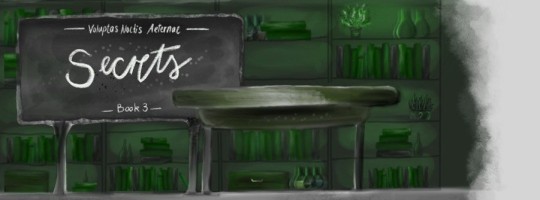
*Severus Snape x OC*
Summary: It is the year 1983 when the ordinary life of Robin Mitchell takes a drastic turn: she is accepted into Hogwarts School of Witchcraft and Wizardry. Despite the struggles of being a muggle-born in Slytherin, she soon discovers her passion for Potions, and even manages the impossible: gaining the favor of Severus Snape. Throughout the years, Robin finds that the not quite so ordinary Potions Professor goes from being a brooding stranger to being more than she had ever deemed possible. An ally, a mentor, a friend... and eventually, the person she loves the most. Through adventure, prophecies and the little struggles of daily life in a castle full of mysteries, Robin chooses a path for herself, an unlikely friendship blossoms into something more, and two people abandoned by the world can finally find a home.
General warnings: professor x student (however no underage romance), blood, violence, trauma, neglectful families, bullying, cursing
Words: 3.6k
Read Part 1.1 here! All Parts can be found on the Masterlist!
______________________________
Hogsmeade was quite as underwhelming as Robin had anticipated, but she found that she enjoyed it nonetheless. High street was crowded with students of all ages, as well as with adults of all ages, which overall was something Robin didn't enjoy. However the shops and taverns looked rather appealing in their particular aesthetic, and she made sure to actually take the time to visit some of them the next time she came here. Today however, she was on a mission.
Finding the way Professor Snape had described was easier than expected, and Robin had to snort at the sheer understatement of him saying students rarely came this way… Everything that lay off high street was practically void of any life in general! Deserted so much that she felt comfortable immediately. No people was better than too many people.
The walk to the shop wasn't actually all that long long, but then again, it was a really small village in general, so this was not at all surprising. Soon, Robin stood in front of the black building with the gold inscription and gave it a lookover. The place seemed dubious, gloomy and just so incredibly low profile that it must undoubtedly be important. Just the place she would expect nobody but Snape to know about. Now… she only needed to gather up the courage to go in. With a deep breath, Robin built up her walls to force all anxiety and doubt out of her mind. If there had ever been a time to allow herself to be bold, it was now. Bold, and stoic, and serious… sound familiar much? Robin rolled her eyes at herself, and opened the door.
"Scurry off, kid… This isn't a place for the innocent." A scratchy male voice greeted Robin the very moment she set foot into the shop.
"If you talk to all customers like that, I'm not surprised that I'm the only one in here. And the first in just how long…? Going by the dust on the shelves and the look on your face, I'd say it's been a while." She shot right back, a perfect copy of calm indifference on her face, even though her heart beat like crazy. No place for the innocent indeed.
The man's eyebrows lifted higher than Robin thought possible, and he let out a small laugh in accordance with his astonished expression. "Fast mouth for such a little thing… Say, how old are you anyway?"
Robin completely ignored the question and simply looked at the man for a moment, making it clear that she wasn't here to chat. Then she went straight to the core of her presence. "I need a variety of ingredients for a potion and I was told I could get them here."
The man lifted an eyebrow at Robin again, but his superior smirk vanished to make room for a neutral expression. Good, maybe he would actually start taking her seriously now. "You want to talk business, alright… Who told you that you could find what you need here, with me?"
"Does it matter?"
"Yes! It matters because I haven't made my mind up if I'm gonna screw you over or not, and your affiliations could play an important part in that decision."
"Who says I can be screwed over in the first place?" Honestly, Robin didn't know why she didn't just tell the man that Snape had sent her. It would likely make things way easier for her to just rely on the professor's reputation. But then again, exactly that was the issue: Robin wanted to be taken seriously for her own sake. And she would never achieve that if she placed herself in Snape's shadow now. Then she'd never be more than the little errand girl.
"You'd be surprised who I've already conned… Wizards far more experienced, and witches far greater than you." The man chuckled. "But I like you, kid. No funny business. What do you need?"
Tersely, Robin read the list of ingredients to him and he moved through the room behind the counter to gather up the various things in return. A minute later, he placed what she'd asked for on the counter. Almost what she'd asked for.
"This isn't Abraxan hair. But you surely knew that already, seeing as you tried selling it to me. It's probably Granian, isn't it?" Robin commented with an (admittedly feigned) unimpressed expression. "I'll grant it to you, they're very similar, but not enough to fool me. You see, while Granian is originally grey in color, it can bleach out enough to turn white naturally. That however, even in the best cases, leaves it with just a hint of an undertone of a different color. Abraxan hair on the other hand is purely white by nature, and thus void of every and any undertone. Looking at this, there's definitely more grey than white in it, wouldn't you say?"
Now the man's jaw dropped in anything BUT amusement, and he looked as incredulous as any person probably could. Surely he hadn't seen that coming… but Robin for her part merely kept looking at him in perfect neutrality. After half a minute of dead silence, he finally spoke up with the first honest expression he had worn since Robin had entered the shop. "Who the hell are you?"
"Someone you don't want to screw over no matter who I'm affiliated with. Now, would you be so kind and bring me the correct ingredients?"
"As you wish." He replied immediately, finally void of all humor and joke, and went back to the shelves to bring out what looked like the same seven ingredients already present on the counter. Those ones he merely swiped out of the way, and placed the new items down with much more care than the first time. "Is this everything you need?"
Robin let her eyes travel over the ingredients slowly, considering and foremost conscious of the fact that she was being watched. The Abraxan hair now looked like what Robin assumed it was supposed to… and that was about everything she could tell. Honestly, to her, all of the other ingredients looked exactly the same as before. She had absolutely no knowledge about any of these items, leave alone any clue to identify if they were what they were supposed to be. It had merely been her dumb luck yet again that she had recently read an article about freaking Abraxan hair and it's astonishing similarities to Granian hair, and even more dumb luck that she had been right in calling him out. Dumb luck was rarely deserved… But she would still take as much of it as she could, as it obviously had just sufficed to make this man believe that she knew more than she actually did.
With her neutral facade still running smoothly, she looked back up at him behind the counter. "Yes, this will be everything. For now."
"You're freaking me out, Miss, but I do respect your knowledge. Not many people would've known the difference between those hairs, and I least expected it from s-..." He stopped mid-sentence as he noticed Robin's glare, then a muscle in his jaw ticked and he avoided her eyes in fairly obvious discomfort. "...from someone like you. This will be sixty five galleons."
"For account of Severus Snape."
"Bloody hell…" The man groaned and hid his face in his hands. "You're with him?!"
"Do you have a problem with that?" Robin rose her eyebrows in question and stared him down again, which clearly seemed to make him even more uncomfortable. On the inside, Robin's pride did a happy dance… she really was doing Snape justice here.
"Let's say I have a lot of respect for that man… But you're no better than him, looking like you can kill with your glares…" He made a face that was almost the opposite of the mocking distaste he'd shown her when she'd entered the shop. "Just take your stuff and go, will ya?"
With a small, innocent smile Robin packed the ingredients into her backpack and then looked back at the man once more while she made for the exit. "Thank you for your assistance. Have a nice day." Without waiting for a reply, she opened the door and let herself out into the street at last.
She managed to keep her neutral facade up until she took the first turn back towards high street. Then the grin on her face widened until it was simply unstoppable, and she had to walk up and down the alley a few times to calm down her racing heart and her lasting excitement. Bloody hell, that had been both absolutely exhilarating and absolutely frightening all at once. Robin couldn't believe that she had actually managed to be intimidating all on her own, and that she'd been taken seriously because of that. No wonder Snape preferred everyone to be intimidated by him… it surely was a good way to get respect.
Finally her heartbeat slowed down, and Robin made her way back to high street with a small smile. If she wasn't mistaken, there was a candy shop here in Hogsmeade… and Snape would surely still be stuck with David until dinner. Maybe it wouldn't hurt to visit that shop before heading back to the castle… maybe it wouldn't hurt to do something normal for once.
… … …
It was late afternoon when Robin left Hogsmeade to head back to the castle, not long after her quick visit to the candy shop had come to a rather sudden end when she had felt absolutely overwhelmed by a horde of people storming the shop, which then had resulted in Robin's immediate departure. Unfortunately, this was exactly the time when most other students decided to return to the school as well, which left Robin stuck in an entire throng of people on their slow trod back to Hogwarts.
"Didn't expect to see you here, jay, out of all people…" A boy one year above Robin spoke up as he fell into line with her. She didn't know him, not really… she only knew that he was one of the Slytherins who took particular joy in bullying her for some reason. She had never cared enough to find out more about him than that though.
"But then again, David did say something like that." He mused, shrugging, then skipped a step ahead and walked backwards as he looked at Robin. "He also said something about you getting him into trouble with Professor Snape, do you happen to know anything about that?"
Robin continued to ignore him, and simply looked at a point far behind his shoulder as she walked on. This kid was friends with David? And David had spilled the tea on the events of last night? Great… that certainly didn't make it easier to ignore his mocking. Robin would just have to stay neutral and ignore this incident, same as always. But obviously the boy wouldn't have that, and neither would his friends who Robin only noticed closing in as they had formed a loose circle around her already. Oh geez, she really wasn't in the mood to deal with these idiots right now… today had already been exhausting enough as it is.
"David said you would be running some errands for Snape today… Is that what you were doing in Hogsmeade?" He frowned at Robin with a mean grin. "You're such a teacher's pet, you know that jay?"
"If that's what it takes to talk to someone other than you idiots for a while, then yes, I'm indeed a teacher's pet. Happily." She replied at last, refusing to let that be used as an insult against her. Getting along with her professors was a good thing, getting along with Snape was great, even, and nobody could convince her otherwise.
"So what is it that you did for him in town? Got him some new torture device? Or poisoned a few people?" The boy mocked, and his friends proved themselves to be loyal peasants as they laughed about his every joke. Again, Robin decided to say nothing. Even if that wouldn't stop them from being jerks, it at least wouldn't make her one of them. Insults never led anywhere other than to more insults, and Robin could very well refrain from getting involved in it. That however was until their strategy changed from insults to actions. "Why don't we take a look into that backpack of yours, huh? See what you hide in there…"
In an instant, the boys beset her and the bag was ripped from her shoulders while they held her arms at her sides with two boys each. Alright, neutrality went a long way with Robin, but this was a step too far. In a natural response of fight or flight, she chose to fight indeed and moved to free her arms, actually succeeding in that, before she lunged at the boy in front of her. Nope, she wouldn't let this vile creature touch any of her belongings.
The boy barely escaped Robin as she jumped at him, but before she could make any attempt to either go at him again or draw her wand, he dashed off together with his friends, Robin's bag still in his hands. In an instant she was after them, not even caring if she had to push people out of the way or go at a full sprint over uneven ground to catch up with them. She would get that bag back, no matter what. This was the third time today she was forcefully reminded that she was only a student, one who didn't fit into her house, one who couldn't escape the cage she had been put into, one who couldn't even prevent getting involved in the childish behavior and shenanigans of her peers. However this time, for once, she had no other choice but to get her hands dirty as well.
… … …
It was over an hour later when Robin made it back into the castle, her bag clutched tightly in her blood and mud covered hands. Hopefully nobody would see her like this. Hopefully she could sneak past everyone despite the stupid limp caused by a twisted ankle. Hopefully… this day would just be over soon. Every step felt like a knife to the core, every inch of her skin burnt like it was clawed open and dipped in salt, and every muscle felt like it was ripped apart anew with each movement. Put shortly, Robin was in quite a bit of pain, but she refused to allow herself to cry over it, to even be bothered by it at all. She wouldn't give them that last pleasure, not even in their absence. She refused to acknowledge that their sheer idiocy had resulted in her getting hurt, even if it hadn't been their intention. There was only a certain capacity for emotions Robin could endure every day, and today she had long run out.
Once she caught sight of herself in the glass of a cabinet, she still had to close her eyes for a moment to force away the anger, and the embarrassment. Honestly, she could be partaking in a contest for the best zombie costume… only that the blood and cuts covering her skin were her own, and the dark bruise forming on her cheekbone was only one of the many that remained hidden under her clothes. However she still considered herself lucky as she made her way to the dungeons, entirely unseen and soon swallowed by darkness. She had gotten her backpack back, and it was still as good as it had been this morning, with its entire contents merely a little shaken up from the run but otherwise in perfectly ordinary condition. The same thing really couldn't be said about her own self, but quite frankly Robin worried more about her possessions than about her body. Bodies healed, objects didn't. Especially not rare potions ingredients that weren't even her possession in the first place.
Robin's feet carried her to the door of the potions classroom without detours, but before she opened the door she took a moment to remind herself of what she would likely find behind this door. The reason for her catastrophical evening going down like it had in the first place, and thus the (even if indirect) reason for the agonizing pain she was in. David. Truth be told, Robin felt very tempted to burst into the room at once and torture that boy without even having to voice a single spell and before he even realized that she was there. But that revenge would be short lived, unproductive and highly inappropriate, even if probably very satisfying for a very short moment. This was the same situation she'd been confronted with in her first year with Alexander, only on a different scale… and she wouldn't make the same mistake twice. She'd try to be better this time.
After taking a deep and thereby slightly painful breath, Robin opened the door and walked into the room with as little limping as she could. Slowly and forcefully calmly she walked towards the front of the classroom where Professor Snape hadn't even bothered looking up from the book on his desk. Perhaps he was so focused on whatever he was reading that he hadn't noticed Robin's fairly silent entry… He didn't look like he was deliberately ignoring her, at least.
On her way to the front, Robin focused her entire attention on Snape, thus on her own part deliberately ignoring David and two other students who were sitting at their own desks and probably writing up some assignments. They, however, didn't ignore her.
"Bloody hell, what happened to you?!" David of course was the first to blurt out the obvious, though in a tone so entirely amused that Robin felt tempted to reconsider her decision on torturing him. "Looks like you've finally fallen out of your ivory tower, huh?"
That at last got Snape's attention, and his eyes lifted off the book in lightning speed to find David across the room, however his gaze came to a sudden halt on Robin instead. The sheer amount of barely noticeable microexpressions flashing over his face right then would have sufficed to keep Robin thinking for an hour at the least, but she wasn't granted that time before he was back to neutrality and addressing her in the gravest of tones. "What happened?"
"I would rather tell you about that without… the additional ears, sir." Robin brought out in a quiet and calm voice that however was just a bit too breathy to not give away how she truly felt. In pain, but also surprisingly numb. Looks like she really had run out of any emotional capacity for the day.
Snape's eyes moved from Robin to the clock on the wall, then to the three other students sitting in the room, and finally back to Robin. "Detention will be over when dinner starts, in approximately forty minutes. If you have no other obligations, you should wait for me in my laboratory."
The laboratory? Goodness, Robin wouldn't be able to decline that no matter how much pain she was in. "Thank you, sir, I will do just that."
"You know how to enter." He merely replied with another of those pointed looks and finally turned his eyes back down to his book.
Robin could tell that he wasn't reading though. The muscles in his jaw were clenching, even if only subtly, and he looked way too tense to be focusing on anything but the room around him. Yet, she understood that this wasn't the place for further conversation, as of her own request, and thus she made her way back to the door with quick steps that hurt more than could be healthy. Three pairs of eyes followed Robin as she grabbed the doorframe too tightly to replace a pained hiss, opened the door abruptly and almost fell into the hallway before slamming it shut again. So much for being subtle.
The walk was luckily short and dark, and Robin found that she could enter the lab with the same spell as the classrooms indeed, but this time she made the effort to lock the door behind herself with the corresponding spell for once. Only then she felt like she could finally loosen the grasp on her bag, could finally allow herself to hurt, could take a true breath at last. The small space really had a calming effect on her, even now. She didn't bother lighting up the candles before she dropped her bag in a corner and sat down on the floor with her back against the side of one of the shelves. Having the wood pressing her jumper against her sore skin wasn't the most pleasant feeling, but sitting at last was enough of a relief to still allow a deep relaxation to wash over her nonetheless. Now that the adrenaline was slowly wearing off and the necessity to protect herself was withdrawing in her head, she felt surprisingly dizzy as she stared out of the window into the last bits of dark grey sky that were slowly taken over by blackness. Before she knew it, the blackness had swallowed her as well.
______________________________
Tags:
@ayamenimthiriel @chibi-lioness @t-sunnyside @alex4555 @beenthroughalot
General Tags:
@its-remy-not-ratatouille @wegingerangelica @dreary-skies-stuff @wiczer @lotus-eyedindiangoddess @theweirdlunatic @caretheunicorn @kthemarsian @lady-of-lies @strawberrysandcream @noplacelikehome77 @theoneanna @mishaandthebrits @i-am-a-mes @nonsensicalobsessions @exygon @hiddles-lobotomy @rjohnson1280 @annwhojumps @spookycatqueen @salempoe @headoverhiddleston @fanfiction-and-stress @createdfromblue @halszka-potter @thecreatiivecorner @themusingsofmany @kinghiddlestonanddixon @scorpionchild81 @crystal-28 @adefectivedetective @lokis-girl-in-mischief @booklover2929 @iamverity @lovesmesomehiddles @akk4rin @whitewolfandthefox @stuckupstucky
#snape#severus snape#snape fanfiction#snape imagine#severus snape x oc#snape x ofc#snape x oc#severus x oc#young severus#young snape#professor snape#snape headcanon#snape community#pro snape#harry potter fanfic#harry potter fic#harry potter fanfiction#harry potter#Voluptas Noctis Aeternae
46 notes
·
View notes
Note
I have seen many, MANY discussions/debates about ca:cw and I have never seen anyone mentioning that Rhodey's injury was a metaphor. How did you get that idea?
Short answer: I’ve actually read a lot on the subject. I’m teaching a media studies class right now called “What Can Superheroes Tell Us About Psychology?” (because that’s the kind of shit you can get away with at giant universities) and hoo boy are superhero narratives More Ableist Than Average. Anywhoo, a few of those readings:
I’m quoting hard from the chapter “Hyper-Normative Heroes, Othered Villains: Differential Treatment of Disability in Marvel” in a book on disability studies because it’s free. A relevant passage:
“These metaphorical portrayals all fail to engage with disability as a social category and as an individual identity, thereby ignoring its context… Nick Fury’s missing eye does not change his aim with distance weapons (e.g. Captain Marvel) or piloting software. Instead, it recurs in the films largely in metaphorical lines such as Fury’s commenting on the death of a friend with ‘I just lost my one good eye’… One character in Avengers even questions the lack of accessibility in Fury’s multi-monitor computer console, and Fury’s assistant simply answers that he must turn his head more often to compensate. The franchise thereby emphasizes that Fury’s missing eye is only a metaphor for his discernment and ability to see details that others have missed, rather than a truly integrated part of his character or even an accurate portrayal of that disability.
“8. This treatment of disability as metaphor persists throughout the MCU. In Captain America: Civil War, superhero War Machine incurs a permanent spinal injury while fighting on behalf of his best friend Iron Man. Later on, rival superhero Hawkeye… ‘You gotta watch your back with this guy. There’s a chance he’s gonna break it.’ The film then equips War Machine with a fantastical prosthesis that essentially nullifies his disabled experience through giving him the same range of motion as his non-disabled [abled] teammates, entirely without side effects or need for maintenance. The MCU films thus present disability as a metaphor for inner morality and characterization. War Machine has few experiences of being a disabled man through his spinal injury, but is instead emotionally ‘disabled’ by the damage to his social standing he has incurred through his friendship with Iron Man… The MCU thereby offers no critique of ableism or inaccessibility, instead continuing to localize disability as a problem with the body and the individual.”
Death, Disability, and the Superhero: The Silver Age and Beyond by José Alaniz is also a fantastic resource, and you can buy it for money here or hopefully find it at a library if you have no money. A few of the relevant points from his book:
Superhero stories often treat disability as a “problem” that must be “solved” through in essence nullifying the disabled experience of the character(s) through superpowers that run directly counter to the disabilities and/or fantasy “cures,” e.g.
Daredevil is blind BUT navigates the world in a way similar to sighted people due to his “radar sense,” meaning that he doesn’t get to have a lot of the lived experiences of blind individuals
Don Blake is mobility impaired and uses a cane BUT his cane transforms into mjolnir and imbues him with the power of Thor, meaning that he spends most of the story moving like a nondisabled person
Hawkeye is hard of hearing sometimes in some of the comics, BUT he often gets magical cochlear implants from Tony Stark that cause him to stop being hard of hearing
Characters that are disabled and remain disabled tend to be villains whose villainy is either implied or stated to come directly from their bitterness over being disabled, e.g.
Doctor Doom hates that he’s scarred by an explosion so much that he wants to take over the world to get revenge on the Fantastic Four
The Lizard only transforms himself because he ignores all scientific and ethical boundaries in his desperation to stop being disabled
Doctor Poison is described by herself and other characters as a “monster” for failing to (unlike Wonder Woman) conform to White Western conceptualizations of female beauty
Characters like The Thing, She-Hulk, and Bizarro have the potential for some really interesting disability narratives. However, the same publication pressures that prevent permanent injury or death to the characters also prevent the inclusion of “serious” “real-world” issues like discrimination unless it’s metaphorical (e.g. anti-mutant fearmongering as a metaphor for anti-AIDS prejudice).
The Big Damn Foundational Text on the intersection of disability studies and media studies is Narrative Prosthesis: Disability and the Dependencies of Discourse by David T. Mitchell and Sharon L. Snyder, and you can pay money for it here but it’s also available at a lot of libraries. Anyway, a couple of relevant points from that book include:
Disability portrayals abound in literature going back to pretty much the dawn of history, but most of those portrayals suck ass because:
Most disabilities are treated as metaphors rather than demographic characteristics, which means that the disabled character doesn’t get connected to other people with disabilities (including those in the real world) and offers no commentary on ableism — if Richard III’s spinal misalignment is just a metaphor for him being “twisted” inside, it doesn’t allow readers with spinal misalignment to identify with him
Disabled characters tend to exist to teach lessons to nondisabled characters rather than having their own journeys — Tiny Tim isn’t a person in A Christmas Carol, he’s an object lesson for Scrooge
Many disabled characters either get “fixed” so that they look outwardly “normal,” or their “ugliness” is used to make concrete the abstract “ugliness” of their personalities
Disability is treated as a “problem” that demands an explanation – Captain Ahab’s prosthetic leg and Joker’s facial scarring are treated as automatically demanding the question “why are you like this?,” even though no one would ever ask the same thing of their nondisabled co-characters
Authors’ implicit ableism tends to come out in their horror of disability, such as when they portray disabled characters preferring death to disability, going to extreme lengths to avoid or nullify disability, and/or declaring themselves “worthless” or “burdensome” in light of disability
Discomfort with disability — another form of implicit ableism – also comes out when disabled characters are overwhelmingly “killed or cured,” meaning that they don’t get to end their stories as living individuals who are still, in practice, disabled
ANYWAY, that’s a long-winded way of saying that I also haven’t seen any critics specifically talk about Rhodey’s disability as a metaphor first and a part of the character second, but that that doesn’t mean the shoe don’t fit. When someone asks about the Accords in Infinity War, Rhodey also says he supported them but then “I’m pretty sure I paid for that,” and gestures at his own paralyzed legs. He also also says in Endgame “I wasn’t always like this… but we work with what we’ve got” when talking to Nebula, BOTH about the fact that he’s disabled and about the fact that half the universe is dead and they’re all struggling to cope with that fact. It keeps getting used as a metaphor and keeps NOT getting used as a part of his identity. LET THE MAN TALK TO SOME OTHER DISABLED VETERANS FOR TWO SECONDS, FOR FUCK’S SAKE.
A couple of other (free!) readings that talk about that general problem of “we love superheroes and we hate ableism, now what?” even if they don’t mention Rhodey specifically:
“Reevaluating the Supercrip” by Sami Schalk connects media portrayals of the paralympics to media portrayals of Captain America and the Doom Patrol. (I swear to god it makes sense in context.)
“Seven Roads to Justice for Superheroes and Humans” by Mikhail Lyubansky gets into the glaring (for me, anyway) question of “why the fuck are sci fi psychologists all so evil and useless?” by explaining why Harley Quinn must be evil for Batman to be a vigilante.
“Superhero Comics as Moral Pornography” by David A. Pizarro and Roy Baumeister (again, I swear it makes sense if you read it) discusses the evolutionary tendency to judge people based on disabilities and why it’s so popular in superhero stories specifically.
Anyway, you probably weren’t looking for an entire annotated bibliography in response to that question, but I’ve never been one to use five words when 500 would suffice.
#disability#ableism#media studies#disability studies#nothing to do with animorphs#war machine#james rhodes#iron patriot#rhodey#mcu#marvel#marvel negativity#superheroes#jose alaniz#sami schalk#disability theory#psychology#long post#avengers#mcu negativity#captain america: civil war#jim-hopper-superhero#asks#paywalls#if you'd like any of the ones that cost money#hit me up and i can scrounge a pdf or two
386 notes
·
View notes
Text
‘MY GOOD WIFE’ v ‘MY FAVORITE HUSBAND’
June 23, 1949
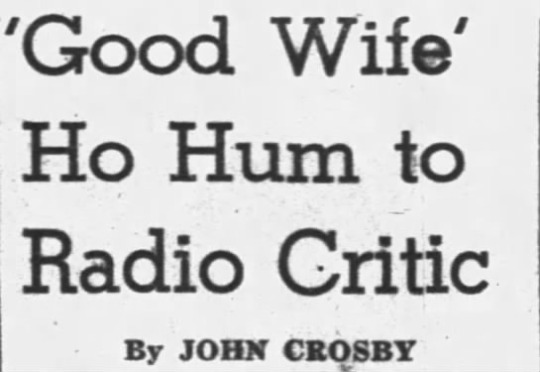
"My Good Wife," an added starter on KNBC, 6:30 p.m. PST Fridays, is another comedy about a young married couple, as if we needed another one. I must admit this one is a little different. This married couple, Steve and Kay Emerson, are not nearly so fast with a wisecrack as, say, Lucille Ball and her husband on "My Favorite Husband," 9:00 p.m. PST the same night on KCBS. Great night for matrimony, Fridays, and if those two programs don't provide enough for you, tune in Dorothy Dix at 1:45 pm. (not broadcast in west). She'll tell you how to win back an erring husband.
I haven't yet made up my mind whether the Emerson's ineptness at repartee is deliberate - after all, not every young wife talks like Groucho Marx - or whether the script writer isn't very good at it either. Anyhow, whether by accident or design, the Emersons are a very restful young couple, possibly a little too restful to get anywhere in the entertainment world. In radio, they're a real novelty.
As a wife Arlene Francis who plays Kay Emerson, wins out on points over Lucille Ball In other regards - talent and looks, for example - Miss Ball is way out front. But how long could you live with a girl who says: "Oh, we don't miss television. I climb in the Bendix and sing and George looks at me through the little window." Imagine having a girl around the house who said things like that before breakfast. It'd curdle the milk.
STARTS OFF FAST
“My Good Wife" started out at a gallop two weeks ago, NBC deciding to set the stage and get everything out of the way all at once. The first program resembled one at those synopses of previous in installments in the popular magazines. Steve met Kay, quarreled with her, married her, taught her how to drive, learned he was about to become a father, and became one - all in 15 minutes. One minute later, the dialogue went like this:
"It doesn't seem like we've been married 12 years."
"We've been married 10 years."
"Well, that's why it doesn't seem like 12."
That, incidentally, Is a little brighter than the conversation around the Emerson household generally gets.
On the second show of the series, the pace settled down to a walk. During the first few minutes the Emersons and their neighbors lay lazily on the grass, not even talking very much. This may be taking realism too far. I mean there ought to be some crickets chirping or something. Things quickened a bit later when Mrs. Emerson decided she was going to help her husband out with his law practice and, of course, messed things up.
YALE, NO LESS
The Emersons are quite upper middlebrow as radio's young married folk go. He went to Yale, for heaven's sake, and she not only went to Vassar but led the daisy chain or whatever they do with that daisy chain. What is this - counter revolution? Oh, yes, they live in Larchmont up to their ears in other upper middlebrows. I don't know what else to tell you about the Emersons except they sound like a nice young couple to have over for a drink some time but conceivably a little mild to entertain you much on the air.
My favorite young married couple is still Ozzie and Harriet Nelson - I put Goodman and Jane Ace off in another category entirely - and while we're chatting about this sort of thing, I ought to point out Ricky and David Nelson, Ozzie and Harriet's children, are now playing themselves on that program which solves a lot of problems. I have a spy in the Nelson household, named - in case any congressional ears are pricking - Harriet Nelson, nee Harriet Hilliard, and she is not now and has never been a Communist nor worked on the atom bomb nor designed the B-36.
Anyhow, my spy informed the Nelsons had a little trouble with the kids. The real Ricky and David I listened to the radio Ricky and David and discovered them doing things they weren't allowed to do or wouldn't do voluntarily if they were allowed. Being children, they got confused over their own identities. Well now the real Ricky and David are the radio Ricky and David and the split personalities in the kids has been averted. You run into a lot of funny problems in radio.
# # #
FOOTNOTES FROM THE FUTURE
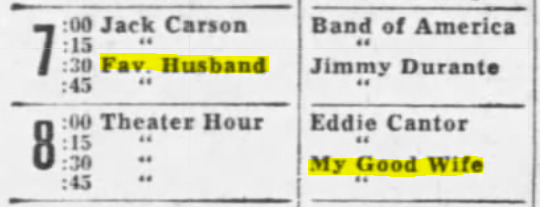
It seems pretty clear that NBC was counter-programming CBS’s “My Favorite Husband”. Not only are the names very similar, they were scheduled on the same night, as critic Crosby points out.
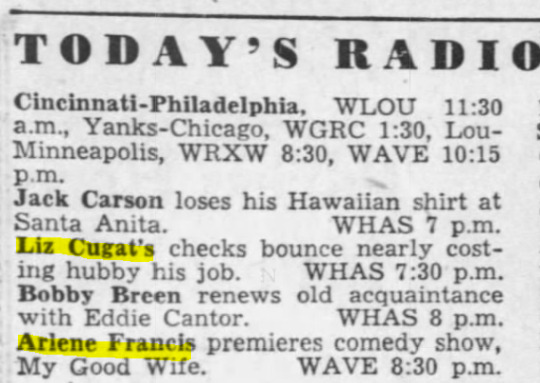
The episode of “My Favorite Husband” described above might apply to any domestic sitcom, but was actually titled “Budget - Mr. Atterbury” broadcast June 3, 1949. However, this newspaper is still calling Lucille Ball’s character Liz Cugat, when her name had changed to Liz Cooper in January 1949, to avoid comparison with the well-known bandleader (no, not Desi Arnaz).
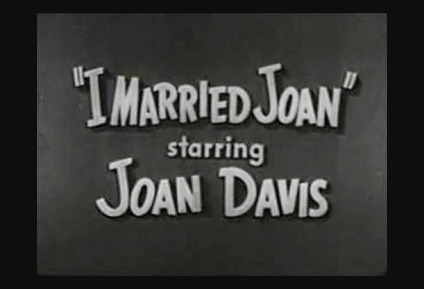
Counter-programming by NBC would not stop on radio. When “I Love Lucy” was a juggernaut hit for CBS TV, NBC created a similar show titled “I Married Joan” for star Joan Davis. It was billed as “The adventures of the scatterbrained wife of a respected city judge.” Substitute “bandleader” for “Judge” (played by Jim Backus) - and you’ve got “I Love Lucy.” Like Ball, Davis was a film star of the ‘30s and ‘40s getting aboard the TV bandwagon. Like Lucy, Joan wanted to be in showbusiness. Many of the same situations that Lucy got into, Joan did too. The series even featured a few “I Love Lucy” refugees: Jerry Hausner, Elvia Allman, Bob Jellison, Margie Liszt, Shirley Mitchell, Ross Elliott, and many others. "Lucy” and “Joan” even employed the same director in each show's first season, Marc Daniels. "Joan” lasted three seasons, from 1952 to 1955 and is all but forgotten today.
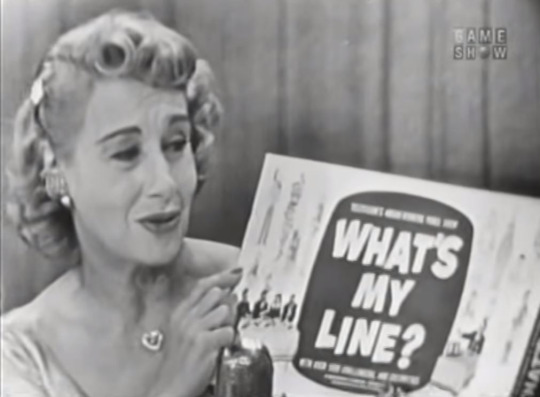
Kay Emerson was not the first domestic radio role for Arlene Francis. In 1940, she took over the role of Betty on “Betty and Bob”, which had been the first successful soap opera. She was one of the hosts of the quiz show “What’s My Name?” beginning in 1938. The show was seen as a model for TV’s “What’s My Line?” which premiered in 1950. Francis would stay with the show for its entire run, including six mystery guest appearances by Lucille Ball.
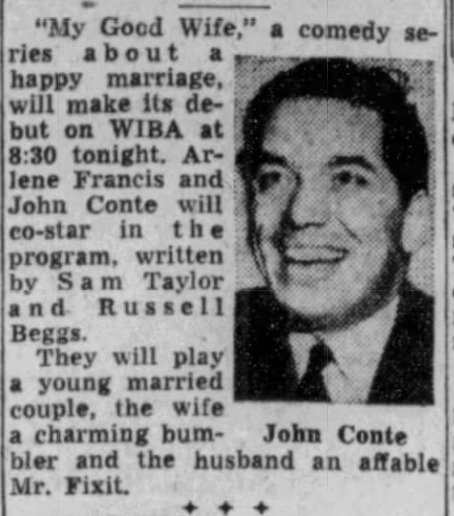
The husband to “My Good Wife” was played by John Conte. From 1944 to 1946 he was married to Marilyn Maxwell (1944-46) who would later appear with Lucille Ball in the 1963 film Critic’s Choice. He had also been seen with Ball (and Maxwell) in As Thousands Cheer (1943). In 1960 he would work for Desilu in an episode of “The Untouchables” (1960).

Unlike “My Favorite Husband’s” mythical mid-Western Sheridan Falls, the Emerson’s livid in the real New York suburb of Larchmont, an affluent village located within the Town of Mamaroneck in Westchester County, New York, approximately 18 miles northeast of Midtown Manhattan. Nearby was the town of New Rochelle, whose most famous fictional resident was Rob Petrie on “The Dick Van Dyke Show” (filmed at Desilu Studios). Danfield, New York, another fictional town in the area, was the residence of Lucy Carmichael and Vivian Bagley for the first three seasons of “The Lucy Show.”
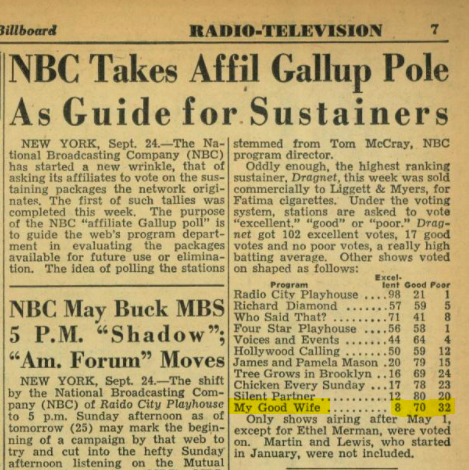
“My Good Wife” began airing in June 1949, and by April 1950 was nowhere to be found. In October 1949, Billboard reported on a new NBC Gallup Poll that placed the show dead last - with 32 stations voting it poor and only 8 saying it was excellent. The future of “Wife” was bleak. The sitcom was cancelled after 18 weeks to make room for the new Jimmy Durante show. Meanwhile, Ball’s “Husband” (on CBS), thrived. Coincidentally, the show was initially a replacement for Red Skelton’s show. Skelton and Durante had both worked with Ball on films.
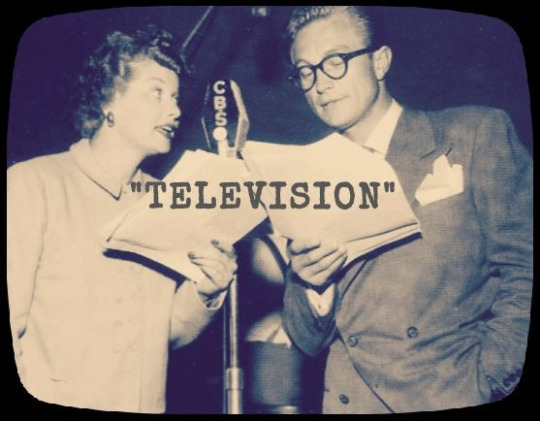
Crosby’s quote from “My Favorite Husband”
"Oh, we don't miss television. I climb in the Bendix and sing and George looks at me through the little window."
was spoken by Lucille Ball in the episode titled “Television” on June 17, 1949. A Bendix is a brand of front-loading washing machine. The porthole-like window was similar to the size screen of early television sets.

Crosby’s observation that Liz talks like Groucho Marx is attributable to the show’s writers Bob Carroll, Jr., Madelyn Pugh, and Jess Oppenheimer. And let’s not forget that Lucille Ball acted opposite Groucho Marx in Room Service (1938)!
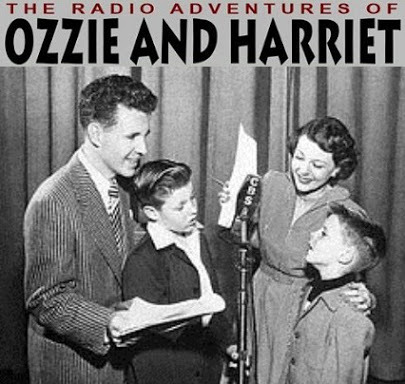
After making the obvious comparison to “My Favorite Husband,” Crosby lets readers know that neither “Husband” nor “Wife” will ever displace “The Adventures of Ozzie and Harriett” in his domestic dome. The show launched October 8, 1944 and a total 402 radio episodes were produced. When it was optioned for television, it was upstart network ABC that made the sweetest deal to the Nelsons.
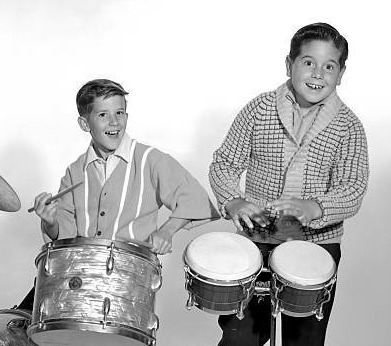
As Crosby alludes to, their real-life sons, David and Ricky, did not join the cast until the radio show's fifth year. The two boys were played by professional actors prior to their joining because both were too young to perform. Crosby’s allegations of possible identity crisis due to watching their parents with other sons on television, might easily apply to “I Love Lucy”, where the real-life Desi Arnaz often lived in the shadow of the young actors playing Little Ricky on television. Mrs. Ricardo and Mrs. Arnaz giving birth to both boys on the same day only added to the confusion - one that still lingers today.
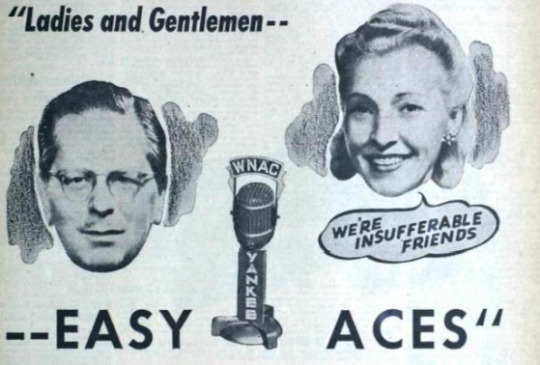
Crosby declines to compare the aforementioned shows with the popular Goodman and Jane Ace. The real-life marrieds had a show titled “Easy Aces” Goodman Ace cast himself as a harried real estate salesman and the exasperated but loving husband of the scatterbrained, malaprop-prone Jane ("Time wounds all heels"). “Easy Aces” became a long-running serial comedy (1930–1945) but did not make a graceful transition to television, lasting only a few months on the ill-fated DuMont Network. Coincidentally, Martin Gabel, who married Arlene Francis in 1946, had a recurring role on “Easy Aces” during the 1930s.
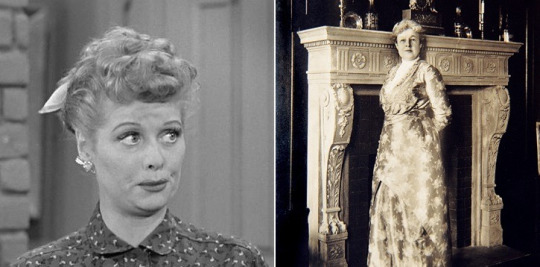
In a more sarcastic shout-out, Crosby mentions capping off this slew of domestic dithering by listening to Dorothy Dix. Author Elizabeth Meriwether Gilmer (1861-1951) was widely known by the pen name Dorothy Dix. As the forerunner of today’s popular advice columnists, Dix was America’s highest paid and most widely read female journalist at the time of her death. Her advice on marriage was syndicated in newspapers around the world with an estimated audience of 60 million readers. Naturally, radio was not neglected, getting their Dix fix when her column took to the airwaves. Due to Lucy’s insistence on interfering in the Mertz’s personal affairs, Ricky compares Lucy to Dorothy Dix in “Fred and Ethel Fight” (ILL S1;E22) on March 10, 1952.
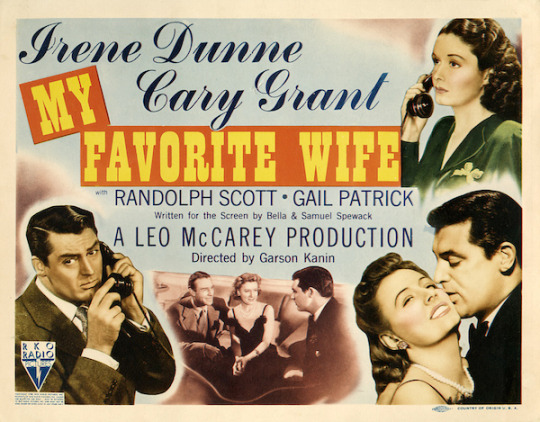
We haven’t yet mentioned this 1940 gem, but we’ll save that for another time!
#My Good Wife#Arlene Francis#John Conte#My Favorite Husband#Lucille Ball#radio#1949#I Married Joan#John Crosby#Dorothy Dix#Ozzie and Harriett#Easy Aces#Groucho Marx#Desi Arnaz Jr.#Larchmont NY
2 notes
·
View notes
Text

Legally Blonde (2001) dir. Robert Luketic. 7.6/10
Very white movie, but also very inspirational.
We love a girl who can prove others wrong. We love people who believe in others.
Vivian being excited to girl talk with Elle is beautiful.
Spoiler: [About the sorority girls in Delta Nu sending a handmade card for their president’s, Elle Woods’, relationship with Warner Huntington III. They believe he is proposing tonight. Elle and her two friends, Margot and Serena, go to the store to buy a dress for her dinner and the worker lies to her to try and convince her to buy an expensive dress. When Elle reveals the knowledge she has in fashion, she refuses. Warner takes her out that night and talks of how he needs a serious girl since he’s going to Harvard Law school. He breaks up with her. The following day, her friends take her to get a pedicure. When Elle sees a magazine article about Warner’s older brother getting married to a law student, she realizes she needs to become one to win him back. She tells her parents of her plans, but they don’t think it’s good since she’s not meant for that life. She goes to her advisor and is told that Harvard admissions won’t be impressed with her degree in Fashion merchandising. She does advise her to have excellent recommendations, a good essay, and at least 175 on the LSATs. Elle starts studying and sends a video as her essay. She gets a 179 on the LSATs. The admissions board discuss and lets her in. She arrives at Harvard and she’s looked down upon for the way she looks. In her introductory group, Elle introduces herself and is introduced to David Kidney, Edie Wexler, and Aaron Mitchell. She passes by Warner in the halls and he’s confused that she goes here. She heads to class and when unprepared for today’s material, she is kicked out of class by the professor, Stromwell. Another student, Vivian Kensington, also supports the idea of kicking her out of class. When Elle vents to herself outside, a guy named Emmett, consoles her and gives her tips on handling different professors. Their conversation gets interrupted by Warner, who reveals that he is engaged to Vivian. Elle finds a nail salon for her bad day. She gets her nails done by Paulette as she vents about her problems. Later, Elle sees Paulette get shy because of the UPS guy. Vivan and Elle answer questions in Callahan’s class with Elle choosing the opposing side of Vivian’s position in the question. Warner plays football with some guys and they love Elle nearby as she cheers on Warner. Elle wants to join Warner’s study session later with Vivian and other friends. They all reject her and she leaves. Edie also turns against her because she heard that Elle called her a dyke. Elle says she doesn’t say that word. Elle calls her friends to vent, but learns that Margot got proposed to by Josh. Elle later overhears of a party that Vivian is having and Vivian tells her it’s a costume party. Elle comes as a bunny, but is the only one in costume. Warner talks with her and says she’s still not serious and can do something better with her time. She says she’s at the same law school and realizes she will never be good enough for him. Emmett sees as Elle goes and buys a laptop. She studies and answers questions well in class. Elle takes Paulette to go to her ex-husband’s, Dewey’s, place to get back the dog he took. He insults Paulette and when Elle acts as her lawyer, they manage to get the dog back. Warner makes an argument about a case in class and Elle is able to properly defend the other side. Callahan calls her after and tells her to apply for his coveted internship. Emmett is Callahan’s junior partner and sees that she gave him a resume on scented, pink paper. Elle learns that she got the internship, along with Vivian, Edie, and Warner. They are part of a case defending Brooke Windham as she’s accused of murdering her husband, Hayworth. Elle understands that she’s a Delta Nu and is a leader in the fitness world. Elle has been to her class at the LA Sports Club and doesn’t believe she killed the husband. The group talks with Brooke as she explains that she didn’t do it. The witnesses are her step-daughter, Chutney, and their pool boy, Enrique. As their team leaves, Elle stays to talk with Brooke and Brooke recognizes her for having the best high kick at the class. Elle is
back at the nail salon and sees a mediocre conversation between the UPS guy and Paulette. She then teachers her the bend and snap and gets the other customers in on it. Elle visits Brooke in prison with a lot of gifts. They talk and Brooke reveals that her only alibi is that she was getting liposuction. Elle keeps it a secret since it can ruin her reputation. Callahan tries to get the alibi out of Elle, but she refuses. When Warner talks to her about giving up Brooke and to only care for herself, Vivian questions her thoughts on him. Emmett and Elle go to meet Hayworth’s ex-wife. She talks of how Brooke had a good sex life with him, but they also had a good looking pool boy, Enrique. Emmett and Elle bond as he drops her off home. She sees David getting rejected by some girls as he asks them on a date and they brush him off as a loser. Elle confronts him and pretends he broke her heart and the girls take up his offer on the date. Vivian comes and talks with Elle about how she respects her for not revealing the alibi. She also reveals that Warner had to have his parents help him get into law school since he got wait listed. The trial happens and the witnesses make it seem bad for Brooke. Enrique says he was having an affair with Brooke. Paulette does the bend and snap badly and breaks the UPS guy’s nose. At the water fountain, Enrique insults Elle and her Prada shoes. She realizes that he’s gay and tells this to Callahan. He dismisses it during trial, but Emmett brings it up subtly when questioning Enrique. Enrique reveals his sexuality accidentally, dropping the topic of an affair. Callahan constantly has Vivian fetch him coffee and do other tasks. During a meeting he has with Elle, he talks of her future and how he can help her as he touches her thigh. Vivian sees and walks away. Elle confronts him and decides to quit. Vivian confronts Elle after and insults her. Elle talks about what happened to Emmett and she leaves. She packs up and goes to say goodbye to Paulette. When she talks about her issues, Stromwell reveals herself at the salon and says she can’t let a prick ruin her life. Emmett and Vivian talk with Brooke in prison and Brooke mentions not trusting Callahan. When Vivian talks about Elle being cozy with Callahan last night, Emmett corrects her and Vivian learns that she made a mistake. They all decide to fix it. During trial, Elle arrives and replaces Callahan as Brooke fires him and Emmett is a licensed attorney that can supervise her. Margot and Serena are also here supporting her. Elle questions Chutney and gets a story that the murder happened while she was showering and she didn’t hear the shot because she was washing her hair. Elle questions her enough to prove that she couldn’t have washed her hair since she got a perm and her hair wouldn’t look as fine as it does right now. Chutney reveals that she murdered her father for being with someone her age. She is arrested. Warner tries to get Elle back after and she says she needs someone more serious. She graduates 2 years later and is introduced as the class speaker by Stromwell. She also gets a job at a prestigious law firm in Boston. Vivian and Elle are best friends. Warner graduates without honors, a girlfriend, or job offers. Paulette is expecting a daughter, Elle, with the UPS guy after getting married. Emmett starts his own practice and is proposing to Elle tonight.]
2 notes
·
View notes
Photo

Bizarre Deaths
Death is everywhere and can visit us at any time. This is no more evident than in these examples of death coming from the most unexpected of sources.
Death is the inevitable end to everyone’s story. We spend most of our lives avoiding it, hoping we will die well into old age without pain or suffering. Yet sometimes death has other, more unusual plans for us, providing strange but timely reminders of our own mortality.
There are lots of strange ways to die, but here are ten examples of really bizarre deaths that came from the most unexpected of sources.
1. DEATH BY BEARD
Having the world’s longest beard certainly comes with its complications. For Hans Steininger, these complications ended in his death. During a fire in town, Steininger hurriedly retreated and forgot to pick up his beard. The beard got tangled in his feet and he fell awkwardly, breaking his neck and killing him.
2. DEATH BY JURY DEMONSTRATION
A lawyer by the name of Clement Vallandingham was attempting to prove his client’s innocence during his trial in 1871. The client was on trial for murder, but Vallandingham believed that the victim had actually shot himself and was not murdered. In court, he showed the jury how he believed the victim killed himself, but apparently forgot to check the chamber. Vallandingham shot himself and ultimately died in front of the court.
3. DEATH BY NECKLACE BOMB
This has to be the story behind the film 30 Minutes or Less because it is remarkably similar; albeit much less funny and more deadly. Pizza deliveryman Brian Well was apprehended during a bank robbery but claimed that it wasn’t as it seemed. Police didn’t believe his story that he had been forced to rob a bank by a group of people he had delivered pizza to. He warned them that he had a bomb around his neck, but it seems they just wouldn’t listen. Wells was killed when the necklace exploded.
4. DEATH BY SWIMMING POOL DRAIN
Abigail Taylor died 9 months after several of her internal organs were partially sucked out of her lower body while she sat on an excessively powerful swimming pool drain. Surgeons replaced her intestines and pancreas with donor organs but unfortunately, the 6-year-old girl died from a rare transplant-related cancer.
5. DEATH BY SHEEP
Betty Stobbs was attempting to feed her sheep one afternoon when things went horribly wrong. She loaded a bale of hay onto her motorcycle and took it to where she kept her sheep. When she got there, the excited sheep ran after her and knocked her and her motorcycle into a canyon. The fall didn’t kill her, but the motorcycle landing on her head did. While the sheep were certainly culpable in the death, admittedly this may technically be more of a death by motorcycle situation.
6. DEATH BY HOARDING
Homer and Langley Collyer had a problem throwing things away. They were bonafide hoarders and their house was filled with junk. Eventually, the junk around their house took control and the two were found dead, buried beneath their pounds and pounds of junk.
7. DEATH BY ROBOTS
They’re coming! They already got one of us! Truth be told, this appears to be more of a negligence death rather than a sci-fi murderous robot. Robert Williams was working at a Ford casting plant when he stepped into the line of fire to remove a faulty part. One of the robotic arms activated and smashed him in the head, killing him.
8. DEATH BY ELEVATOR
Dr. Hitoshi Christopher Nikaidoh was decapitated as he stepped on to an elevator at Christus St. Joseph Hospital in Houston, Texas in 2003. According to witnesses, the elevator doors closed as Nikaidoh entered, trapping his head inside the elevator with the remainder of his body still outside. A subsequent investigation revealed that improper electrical wiring installed by a maintenance company several days earlier had effectively bypassed all of the elevator’s safeguards, enabling it to move under any circumstances.
9. DEATH BY ORANGE PEEL
Daredevil Bobby Leach stared death in the face many times. He was the second person history to ever survive his fall from Niagara Falls in a barrel. He probably assumed that he would die during one of his stunts, but his death came in a much less exciting manner. While walking down the street in New Zealand, Leach stepped on an orange peel his feet went out from underneath him. He broke his leg and was taken to the hospital, but later died due to complications.
10. DEATH BY CACTUS
David Grundman and his buddy were having a grand-old-time shooting cacti in a desert one evening in 1982. When the 26-foot-tall cactus was shot, it fell and crushed Grundman, avenging its fallen cactus brothers. ____________________________________
Take a look at some of Some more most bizarre deaths
1. Death By Turtle In 455 BC, the Greek author Aeschylus was supposedly killed when an eagle dropped a turtle on his skull. 2. Death By Beard In 1567, Hans Steininger was killed upon breaking his neck. The accident occurred after he tripped on his own beard, which was 4.5 ft long! 3. Death By Food In 1771, King Adolf Frederick of Sweden died after he consumed a massive meal. The meal consisted of lobster, caviar, sauerkraut, kippers, champagne and 14 servings of desert. 4. Death By Effective Defense Strategy In 1871, a defense attorney, Clement Vallendigham, from the great state of Ohio passed away after shooting himself. He did so whilst demonstrating that the victim in the trial could have shot himself, rather than being murdered by his client. The defendant was found innocent. 5. Death By Shaving In 1923, George Herbert, the 5th Earl of Carnarvon (that’s in Wales), died after he cut open a mosquito bite while shaving. It became infected and killed him soon after from pneumonia. 6. Death By Acting In 1958, Gareth Jones, an actor, died on a heart attack in between scenes in a TV play. His character was supposed to die in the same way. 7. Death By Machine In 1979, Robert Williams, who worked in a Ford Motor Company factory, made history as the first person killed by a robot. He was struck in the head by one of the cranes. 8. Death By Window In 1993, A Toronto lawyer fell to his death after hurling himself at a window on the 24th floor of the Toronto-Dominion Center. He was trying to prove that the glass was unbreakable – and he was sort of right. The glass never broke but, rather, it popped out of place and fell to the ground with him. 9. Death By Wee In 2007, a woman by the name of Jennifer Strange fell victim to bladder failure and died during a promotional radio contest called, “Hold Your Wee For Wii,” in which contestants attempted to go the longest without peeing in order to win a Nintendo Wii. 10. Death By Nature In 2009, Canadian folk singer Taylor Mitchell became the only recorded adult person to be killed by coyotes after they attacked her in Cape Breton Highlands National Park. 11. Death By Choking In 2012, a man died after choking on a cockroach during a roach-eating contest. 12. Death By Selfie In 2014, Oscar Otero Aguilar, 21, died after shooting himself in the head while posing for a selfie with a loaded handgun.
8 notes
·
View notes
Photo
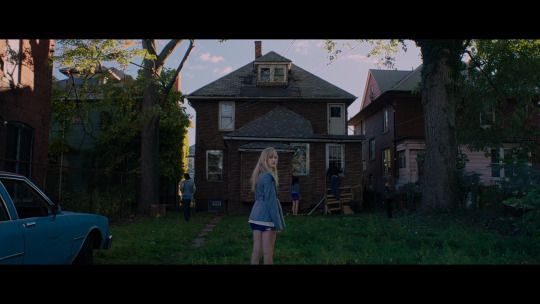
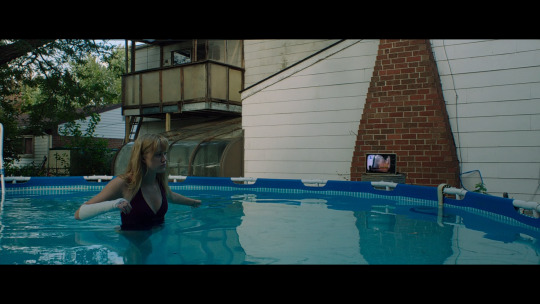
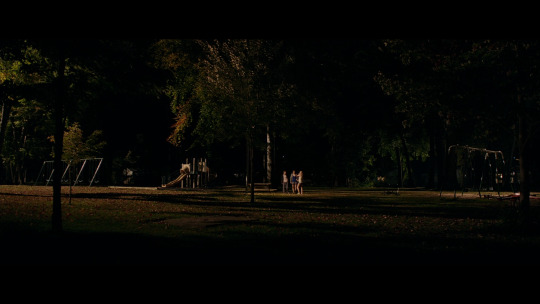
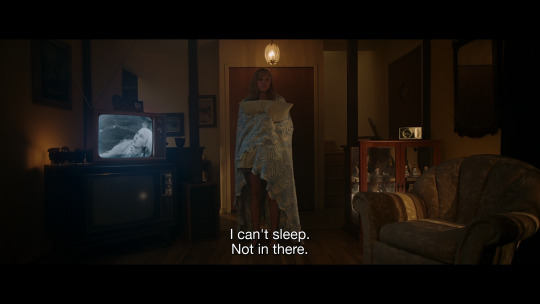
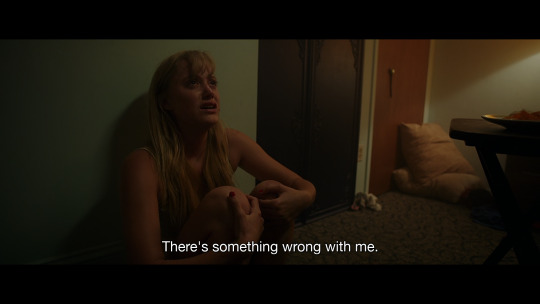
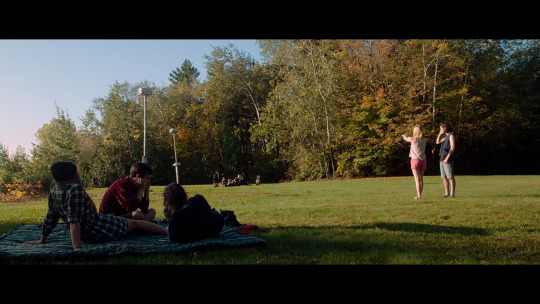
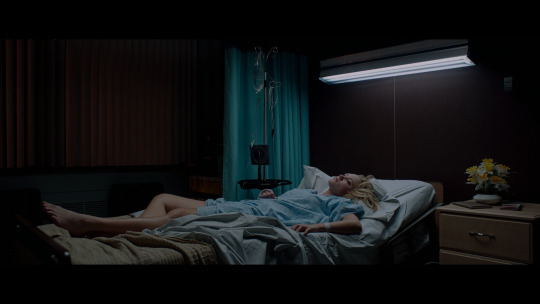
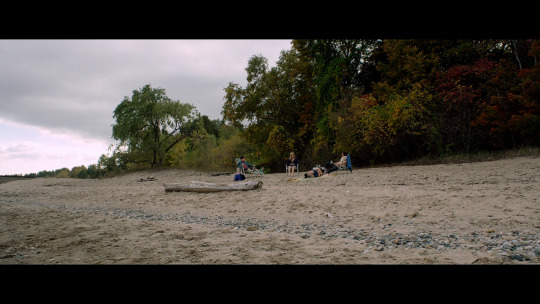

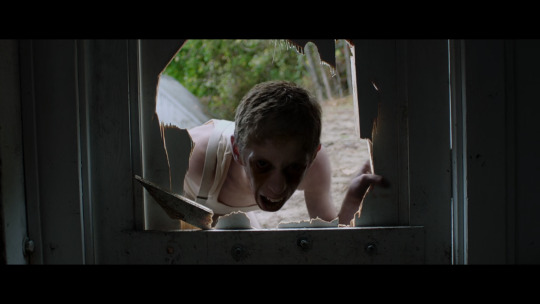
This past decade(s) there have been few great horror movies. Lost in uninspired sequels/prequels and few original storytelling and mostly based on cheap jump scares instead of truly scary moments told in actual pictures, the modern horror movie seems to struggle with delievering horrifying sequenses and being, yeah well, truly scary.
Sure, there have been some great exceptions, like “The Witch”, “The Babadook”, Ari Aster’s first two full feature films “Hereditary” and “Midsommar” - but all in all they are just a few bad (as in really good) seeds midst all rotten fruits.
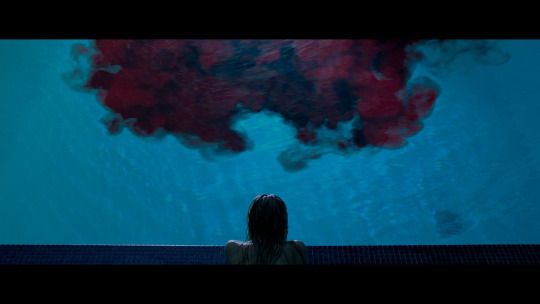
During the 2014 edition of Cannes Film Festival in France a director named David Robert Mitchell broke out with his truly original and horrifying “It Follows” and it was immediately praised for its original take on STD’s and stunning visuals even if shot on relatively low budget.
The film starts out in the suburbs on a calm evening, only a mother is out packing out her car of groceries, when suddenly a young lady is storming out in panic. The mom on the other side of the street packing out her car asks if everything is alright, and the young lady answeres “yes” but we can clearly see that’s a lie. But we really don’t have a clue what is going on. Not yet anyway.
The girl is running back to her house, now with her father worried sick, but only to get her (fathers) car keyes. She drives off and it now seems that she is being hunted by someone. Or something.
youtube
Ending up on a beach, a place for the youth to relax and enjoy one another (in one form or another), the young lady seems to feel safe - for the moment. But by the arrival of the morning she’s no longer alive. As so often in horror movies the first character(s) we meet is not the protagonist nor the heroine, but an establishment of how great of a threat someone - or by the state of the properly tufted young lady rather SOMETHING (more than a human)!
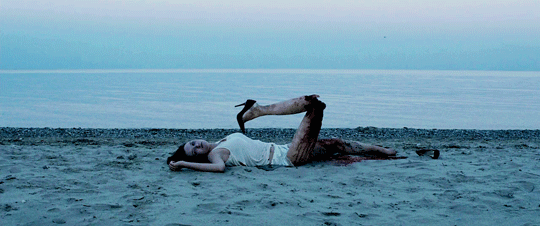
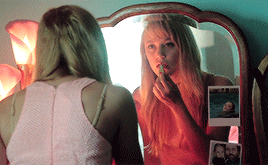
Shortly thereafter we meet another young lady. She, Jay, is much clearly “in focus” as we got to spend time with her in her room dressing up for a date. Just as her, the audience believes the date is something special - and as they meet up outside a cinema (that is showing Charade with Audrey Hepburn) it really seems so. They play a game, that first seems very sweet and innocent. They pick a person around them who they would like to switch lifes with. The guy starts, and as they bought tickets and have entered the lobby and without Jay guessing right about who he (her date, that she by the time think is “Hugh”) has choosen he reveals that he would like to change place with a little kid. They joke around that he can then poop himself anytime he wants, but when he later gets killed by the entity it has taken the form of his mother - that probably took advantage of him sexualy when he was younger - and just wants a normal family to be taken care of. But now I’m getting ahead of myself. Lets wind back!
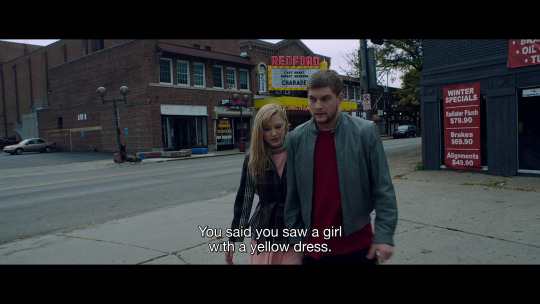
In the movie theater, waiting for the film to start, Jay now take her turn in the game and chooses someone she would switch with. She does so pretty quickly and when he tries to guess who she have choosen he takes a wild guess at a girl in yellow dress. Which confuses her just as much as the audience - since such a girl is nowhere to be seen in the saloon. That freaks him out, but not for the obiously reason we might first think. They rush out of the saloon and he excuses himself with the need for air - and maybe some coffee.
If we “look” at the the girl only “Hugh” can see we are only given very little information. She cannot be seen by others than “Hugh” and 2). she wears a yellow dress. It sounds cheerful, pretty and warm, but in color analysis yellow also have negative associations. According to this site yellow also stands for cowardice, sensationalism and mental illness. Does that means that he is “seeing her” only in his mental state? It could appear so, but shortly after they have sex he then drugs her. Which is confusing, because he doesn¨t have to drug her to have sex with her - which the situationen otherwise suggest - and that the director really “playfully” uses to create confusion and uncertainty.
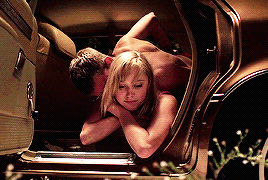
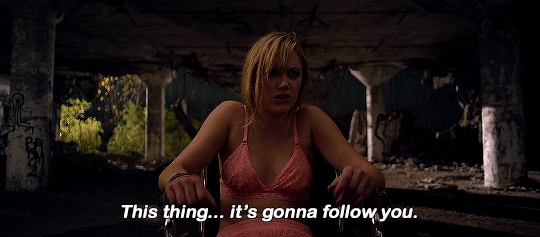
When she wakes up again she is constrained to a wheelchair. The situation is just as bad for her as for the viewer. Has he taken her there to kill her? It could appear so but soon he calms her down with the assurance that he hasn’t taken her there to harm her. But why? A person is walking towards them and he explains that now that he has “passed it on” by having sex (hence the interpretation that the film is about STD’s) and that she under no circumstances let those persons walking towards her touch her. Which might be confusing and scary for Jay, but the viewer now get the connection to the girl in the beginning. That is dramaturgically called an catalyst (or: plantation), where a person or happening is introduced but only to give the story bigger meaning later on.
Jay is dropped of outside her house, and then “Hugh” dissapears. Which could be seen as a comment on modern “dating” where a guy (or girl in some cases) dumps the “victim” right after having sex. We live in a society where we throw away stuff way to easily and that seems to have been taken on even socially.
From the porch, Jay friends and one sister Kelly, sees everything and rushes to her to make sure everything is alright. But it isn’t (obviously). So they call the cops. But as the sex was consensual and he didn’t really hurt her, and his identity seems scetchy they can’t really do anything. But he will play a part and has not yet been played out in the story. We just don’t know how yet.
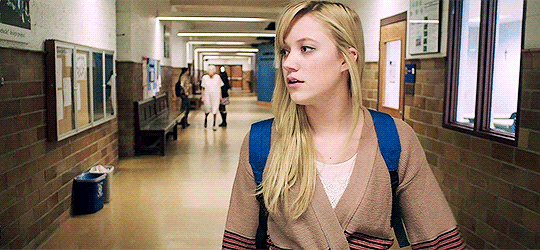
The next day, when Jay is in school, she is approached by an old lady. She don’t recognize her, but was told to watch out for shady people walking slowly towards her - even if “It” is taking the form of a stranger or a more familiar person to get close to its victim. And if we now presses paus and goes back a bit to “Hugh” and his lady in yellow dress. WIth this new information we understand that she was “it” trying to get close to him. And with the older information about yellow being a “color of cowardness” we can now “read” that the “it” also can take the form of the fear and guilt of the victim. He feeling bad for taking advantage of her, simply put to get laid but in the context of the story to “pass it on” and no longer being the first target in line. We also learn that it’s only the first (latest) person in line to be haunted by “it”. Which only cements Jay’s role as the protagnoist - who ALWAYS should grow and evolve through the story (wheter it might be an childrens story, a book in general, a video game or in this case a movie) towards the morality of the story.
So, what might the morality of the story be then? Maybe the answere is in the way “It” approaches its victims - by assuming familiar characters thats also seems to hold some personal trauma to them. By running away from the fear and hide away and hopes the problem just dissapears, people die. Maybe it’s traying to say to us: don’t walk away from your fears, or trauma, but try to meet them and work against them so you by time can move on from them without taking to much psychological harm in the long run.
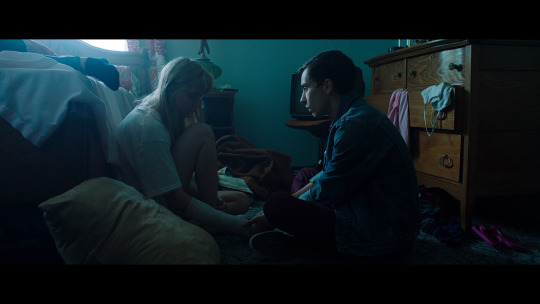
One of her friends is Paul (played by Kier Gilchrist that some years later would get a wider brakethrough in the Netflix-show Atypical where he plays a young man with Asperger syndrome) who seems to have a more than friendly history with Jay (played by Maika Monroe) which is made clear throughout the storyline as he tries to “get in her pants” but with his logic only to be “heroic” by letting her “pass It on to him” and thereby getting her out of the haircross of “It”.
But Paul is not her first choice. Maybe she doesn’t like him back, but probably beacuse she doesn’t want to put her friend in danger. The “lucky one” is instead a neigbhour with a car and a tough appearance. He helps her get to places and after an accident he sleeps with her - with the same motive as Paul, or at least he says so. Appearently, he doesn’t really believes in her “crazy theories” (since he doesn’t have all the information the other characters, and we as viewers, have) but just wanted to have sex. Which is going to punish him. But why? Because of the souless sex? Or because he doesn’t take the problem, the fear, seriously and tries to really solve it but instead live on with his life as nothing have happened? Probably both! Lying to get what you want is not very nice.
As she can see to the neighbour’s house across the street from her own window, she can see when a stranger (everyone who “has it” can see them walk around, but not anyone else) aproaches his house and throws a stone through the kitchen window - that also happened to her the evening after she “got it” - so now David (who both directed and wrote the film) plays with something that is called repetition - simply because something is happening more than once to improve the dramaturgelly effect, and the second time around escalate evertything - in this case by making “It” visible, and something Jay now can take action against. The first time, when it happened to herself, she only heard the noice of a window getting crashed (or, it was Paul sleeping on her cauch who heard it and then alarms her). This is very effective since Jay sees the intrusion as it happens and she now have a moral obligation (as the protagonist also always should be a moral compass for the viewer and always act “right” to not alienate the viewer to much) to help him. Which she’s really tries to do. But as “It” takes the form of his mother, probably by confronting him in form of someone familiar but also with a boob hanging out so maybe tries to comfort him by breastfeeding, who now is banging on his door - and as he opens she jumps him and his storyline is now literally over.

An interesting detail that is established early on in the story is that one of Jay’s friends - Yara (played by Olivia Luccardi) - is reading The Idiot by Fyodor Dostoevsky on her “e-reader” and as she later on is hurt badly and put in hospital she use the text to “use it” on her friends and their situation. Especially Jay is reflected by it:
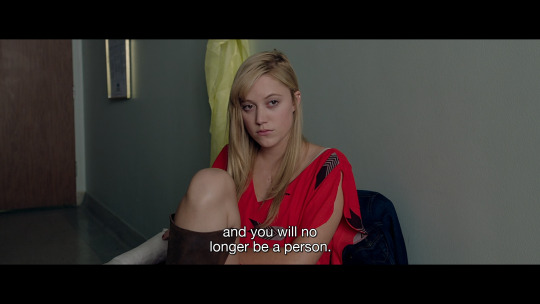
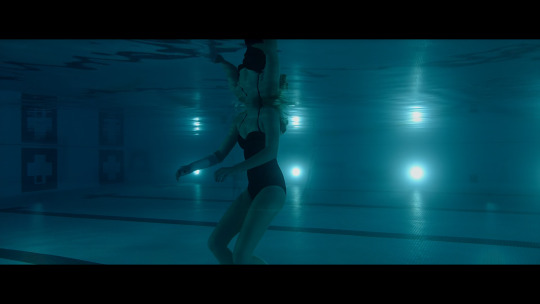
As she understands that she can no longer run from “It” but have to confront it (her fears, that seems to be related to giving birth as she sees “It” as a burned out woman who’s water just broke... and later as a very scary child that almost looks more like something of a monster in a video game) and no longer just run away frorm “It”. So they go to a swimming pool to set a trap for “It” and it finally seems that the gang has the upper hand in all this. A well telled story “always” make us feel like its all hopeless but then let a ray of light shine through!
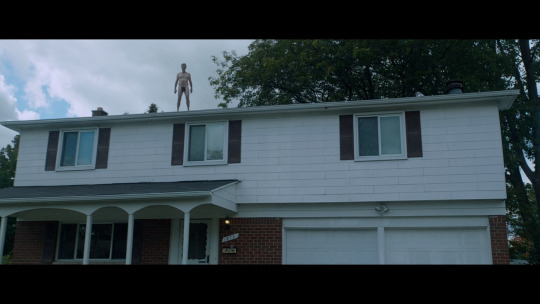
As they are going, “It” now appears on the rooftopp in form of a naked man. As Jay drives out of the garage and out on the road, she gasps as she sees the man on the roof. Because he is naked? Maybe partly, but mostly because “It” probably have taken the form of her father - who have never been seen in the film, so he’s probably “out of the picture”, maybe because he was molesting her as a child and have been kicked out - or maybe, even better, put in prison for it.
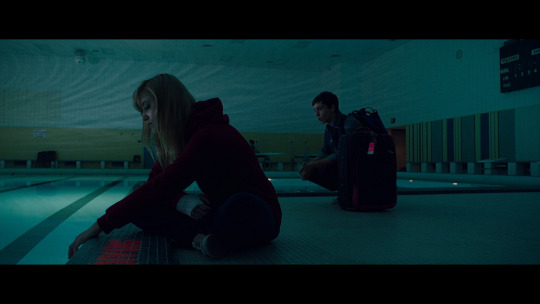
As they set the traps around the pool they still feel they have the upper hand in the situation. But as Jay puts on her bathing suit and goes into the pool, some beautiful shots of her under water (and the reflection of her body on the surface) suggest that she no longer have a personal face and have lost herself to “It”. This goes hand in hand with the paragraph from The Idiot that Yara later reads to Jay in the hospital. The struggle and personal questioning gives her... if you all excuse my choice of words... depth.
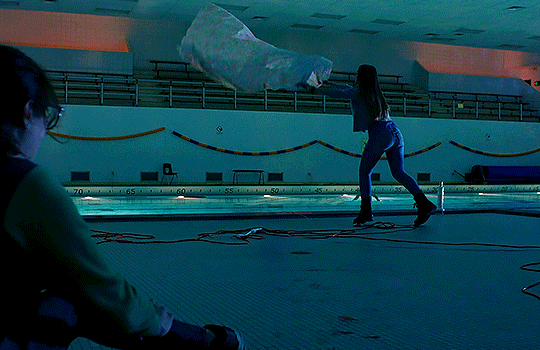
As the final confrontation takes place nothing goes according to plan. All their planning and preparations is wasted in a blink of an eye. But as everyone who tackles with their personal problems in life realises that you can never plan your life to full - because so much other stuff is going to happen that you possibly can’t take into calculation, but rather have to be adaptive and improvise to overcome all obstacles - our group doesn’t give up but reorganizes and finally overcomes all problems. Together. Hiding all alone and trying to solve her problems all by herself wouldn’t help much but rather end in her death.
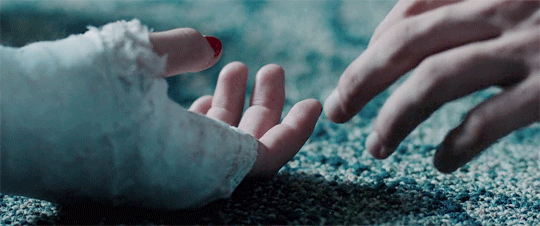
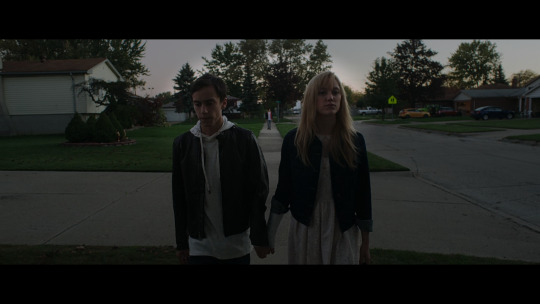
As Jay and Paul “find each other” (see: the gif where their hands toches) earlier on, they “finally have sex” but since it’s just for helping her, and he probably feels that she doesn’t really want, he doesn’t feel like it was so great that he hoped it would be. But as he stood by her all the time, and had more romantic intentions with her all along, they end up together. At least in a way. And as they walk down a road in the end, and we see a person walking behind them, we are suggested that they never fully killed “It” and that it’s still after them. Which probably both is a play with the expectations that horror movies ends with an “open road” to an sequel - but also tells us that even if we start to tackle our problems, trauma, with for exemple therapy, our ghosts will never really leave us alone. But that it’s getting easier by time, especially with someone on your side. Linou have studied film production for a year in Stockholm, and are now studying screenwriting in a program of three years (180hp) in Dalarna. This is what he came up with after re-watching the film and read “Hansel and Gretel” with his class and the teacher breaking down all terms for us.
#It Follows#David Robert Mitchell#horror movies#modern horror#film essays#film analysis#Maika Monroe#Keir Gilchrist#jump scares#The VVitch#Robert Eggers#The Babadook#Jennifer Kent#Ari Aster#Midsommar movie#Hereditary#Cannes Film Festival#Charade#Stanley Donen#Audrey Hepburn#Atypical#Netflix shows#asperger syndrome#storytelling#story mechanics#The Idiot#Fyodor Dostoevsky#personal problems#fear#trauma
8 notes
·
View notes